

AUTUMN 2025
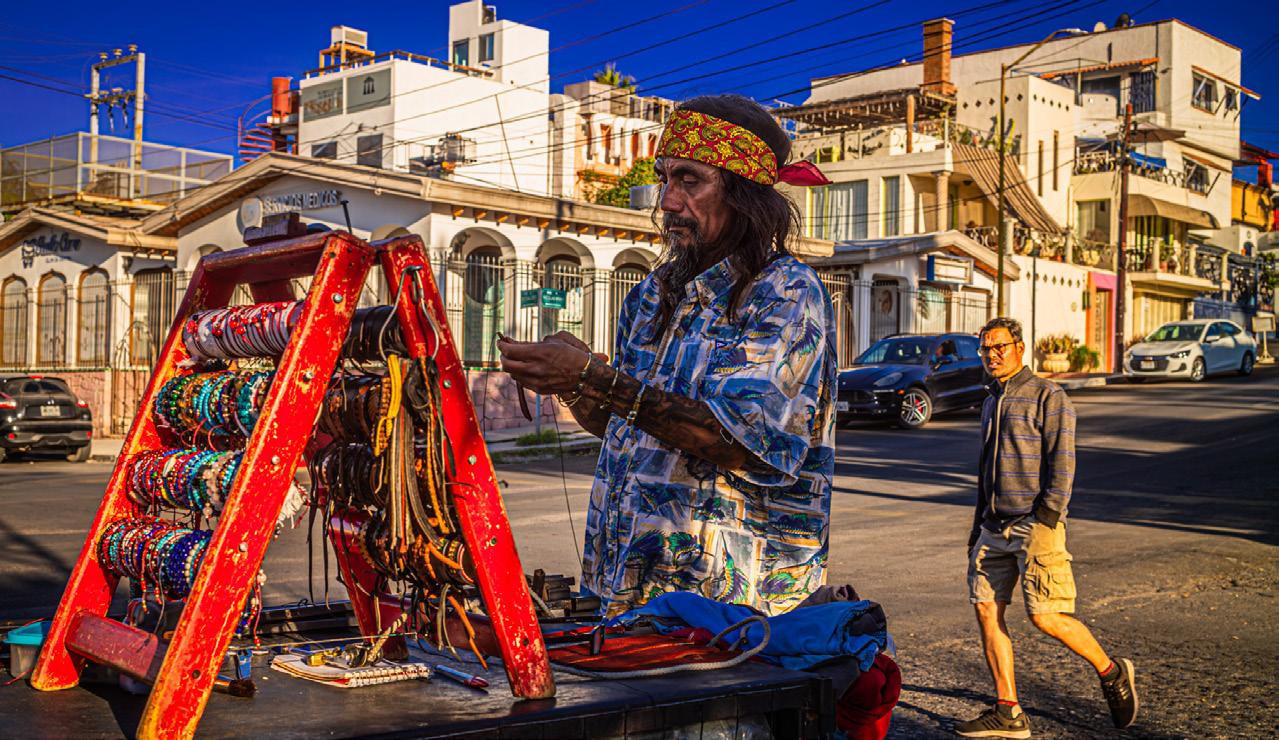
Director
Professor Héctor Hoyos
Associate Director
Elizabeth Sáenz-Ackermann
Academic and Student Services Officer
Joaquín-Emiliano Chávez
Events and Communications Officer
Samantha Cosentino
Academic Grants and Outreach Coordinator
Molly Aufdermauer
Curator for Latin American, Iberian and Mexican American Collections
Adán Griego
Cover: Cuba, 2017, Samuel Garcia
Above: Mexico, 2025, Paul Festa
The photos featured in Enlace were submissions to the annual Stanford Global Studies photo contest.
Internationalism is a civic virtue. “The vain villager believes the whole world is his village [Cree el aldeano vanidoso que el mundo entero es su aldea],” begins José Martí’s influential 1891 essay, “Nuestra América.” Here the eminent Latin Americanist thinker recognizes that navel-gazing has serious consequences. Vanity and parochialism not only paint a skewed portrait of reality, they keep entire polities at bay.
By definition, centers devoted to international studies provide some remedy to such ailments. And yet, possessing a wealth of knowledge about a world region does not necessarily affect one’s own positionality. It is possible to know a lot about Latin America without, in so doing, learning about oneself — and being changed by that knowledge.
At Bolívar House, we foster interdisciplinary scholarship about Latin America while embracing different points of view. What is it like to see the world as a Mixe Indigenous Mexican farmer? As an Argentinian economist? As an
LETTER FROM THE DIRECTOR
Ecuadorian rainforest environmentalist? Through our yearly lecture series and cognate events, we provide a platform for precisely such a multifarious inquiry.
Over the past two years, through uncertain times, we had a series of milestones. Our CLAS M.A. cohort of 2025 produced stellar work, with graduates completing master’s theses and capstone papers now available through the Stanford Library’s digital repository, all eminently worth consulting. Several firsts appear in this cohort: a learned cultural studies take on dembow, the popular AfroDominican music genre; a fiduciary examination of Mexico’s latest wave of privately funded infrastructure development projects; a study of foodways education along the Sonoran Desert; an aesthetic and ethnographic appraisal of lucha libre in Mexico City and San José, California; a literary history of the trope of migrant motherhood among Chinese descendants in Perú; and a historiographic discussion of post-slavery Brazil. This ruefully
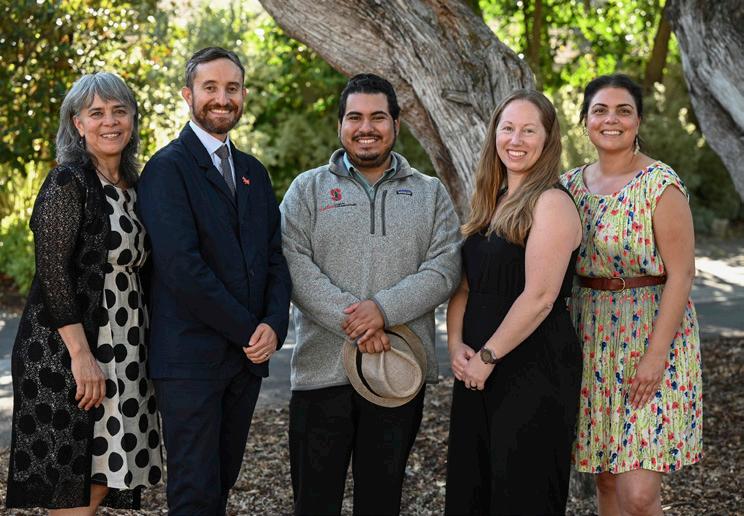

incomplete list represents the astonishing breadth and depth that students achieved over the course of one intensive year of study.
Faculty mentors went above and beyond in making themselves available and providing thoughtful guidance to master’s students (while also generously serving in selection committees that sometimes evaluated over one hundred applicants!). Advanced graduate students from across Stanford departments served as peer mentors for the M.A. candidates, modeling research excellence and academic citizenship. CLAS’s stellar administrative team — Elizabeth, Joaquín-Emiliano, Molly, and Samantha continue to excel while keeping the larger mission in focus.
Two new programs have significantly enhanced our offerings: a dissertation completion fellowship and a one-year postdoctoral program. Our inaugural
Héctor Hoyos
The 2024-25 CLAS team (left to right): Elizabeth Sáenz-Ackermann, Héctor Hoyos, JoaquínEmiliano Chávez, Molly Aufdermauer, and Samantha Cosentino.
dissertation fellows a historian and an anthropologist report a high level of satisfaction with the program’s combination of research time, mentorship, and community engagement. One has secured an additional competitive fellowship from another Stanford unit; the other earned an assistant professorship at an Ivy League institution. Our incoming post-doctoral fellow (featured elsewhere in Enlace) brings cutting-edge political science training from UC Berkeley.
Our vibrant quarterly speaker series brings our community together for lectures primarily featuring visiting professors and scholars nominated by Stanford faculty and graduate students. Many events emerge from collaborations with the Tinker, Luksic, and Nabuco foundations, as well as the Latin American Perspectives journal — a testament to CLAS’s deep Bay Area and international networks. Other speakers include distinguished academics and, once a quarter, practitioners from across domains. Topics range from human rights to development, musicology to ecology. I am pleased to report that our thirty-five seat auditorium fills with M.A. students, peer mentors, fellows, visiting faculty, doctoral students, undergraduates, affiliate faculty, and community members, plus livestream audiences.
Speaking of community members, CLAS remains committed to outreach, including new collaborations with several Latin American consular offices. A unique occasion approaches: our 60th anniversary celebration on Friday, December 5, 2025. (Please mark your calendars!) Co-curated with former center directors, the event will feature a formidable speaker lineup to be announced in due time. This will be an opportunity to reflect on CLAS’s legacy and continue to shape its future.
As we welcome a new cohort and kick off the 2025-26 academic year, we extend our deepest gratitude to all who advance rigorous Latin American scholarship and provide the best education to the next generation of regional leaders.
Con saludos cordiales, Héctor Hoyos
Professor of Iberian and Latin American Cultures Professor, by courtesy, of Comparative Literature Stanford University
Stakeholder and Team Updates
We thank the founding director of the Cuba Observatory, Professor Mikael Wolfe (History), for his leadership during the past two years and welcome Professor Lisa Surwillo (Iberian and Latin American Cultures) to this directorship. Professor Rebecca Tarlau (Education) will serve as Director of Graduate Studies
Former Academic and Student Services Officer Megan Bonilla is now Associate Governmental Program Analyst at CalFire. Joaquín-Emiliano Chávez assumed this role in October 2025. Meanwhile, former Events and Communications Officer Sara Clemente is now Graduate Medical Education Diversity Program Manager at the Stanford School of Medicine. Samantha Cosentino assumed this role in February 2025.
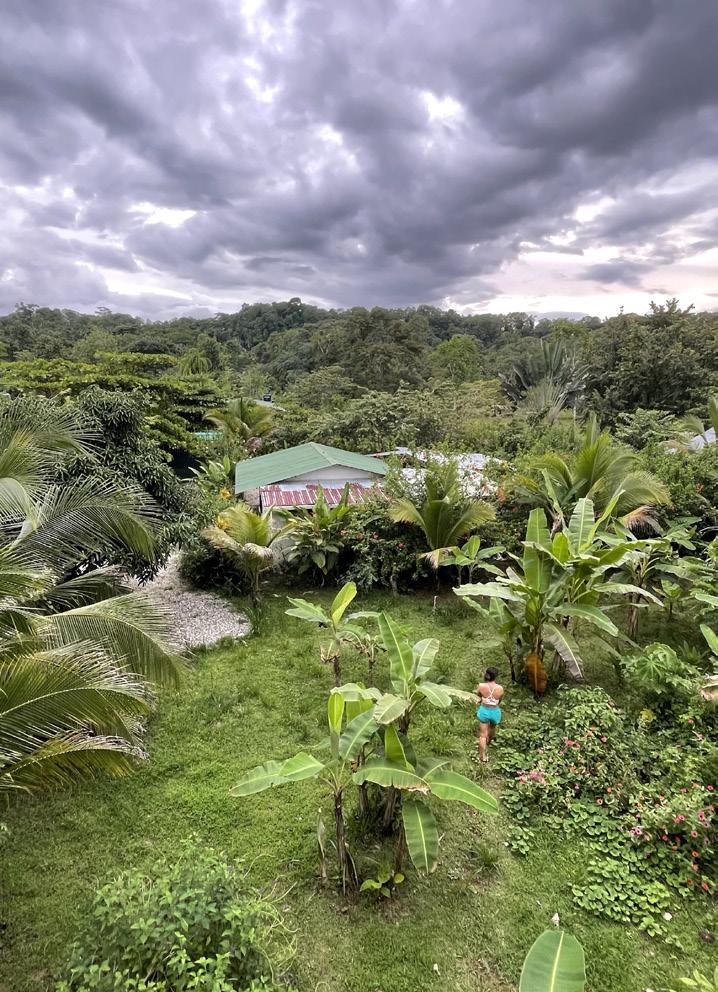
Costa Rica captured by graduate student TJ Francisco in 2022.
1898 Today’s Bolívar House was built this year on the Stanford campus. It served as the residence for George Mann Richardson, a Chemistry professor, one of the fifteen original faculty members at the university.
60+ YEARS AT CLAS

1944 Ronald Hilton (1911-2007), a British-born, Oxbridge-trained professor of Romance Studies, founds the Institute of Hispanic American and Luso-Brazilian Studies (IHALBS) The institute operates out of Mariposa House, now across from Bechtel International Center. Archives paint Hilton as a larger-than-life figure, a resolute leader, and an inveterate contrarian.
1950 The Hispanic American Report, the institute’s flagship publication, is founded.
1961 While doing research in Guatemala, Hilton blows the whistle on the CIA-led preparations to invade Cuba that came to be known as the “Bay of Pigs.” The Cold War is warming up, and Stanford Latin Americanists find themselves in the maelstrom.
1964 Hilton states in the manual for The Hispanic American Report : “The predominant obsession of Latin America, Spain, and Portugal today is politics — not the abstract variety which flourishes in more metaphysical lands, but a peculiarly personalist brand, involving a day-to-day struggle in which revolution and unrest are often accompanied in a paradoxical way by economic and social growth.” The Report ceases to publish; Hilton resigns as director at 53 and eventually becomes a professor emeritus.
1965

The Institute of Hispanic American and LusoBrazilian Studies transforms into the Center for Latin American Studies (CLAS), which officially opens in the fall quarter thanks to a Ford Foundation grant from the previous year. The U.S. Department of Education establishes the Higher Education Act of 1965, which, under the auspices of Title VI, Section 602(a), serves to strengthen and operate language and area studies centers or programs that will serve national needs. CLAS becomes a designated National Resource Center at Stanford set to broaden Latin America area studies and strengthen training in the major languages of Latin America.
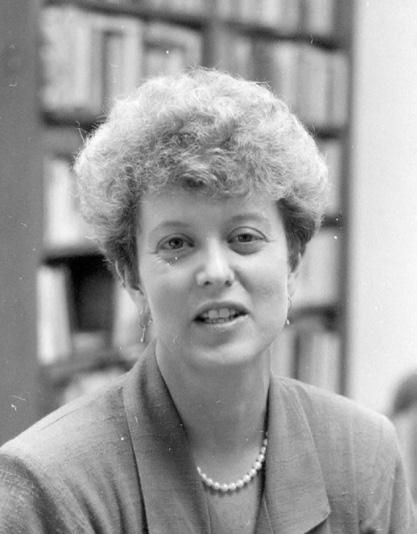
“One story I love came from the great novelist and writer Eduardo Galeano, who I had to convince to come because we were ‘the belly of the beast.’ I wanted to say goodbye to him. He came down stairs, and complaining about the number of books he was shipping back to Uruguay — many more than the boxes we gave him, he said, “¡Teresita, ¿adivina qué acabo de descubrir? Si dejas libros solos en tu oficina por la noche, se reproducen!”
— Terry Karl CLAS Director, 1990-2001
1971
The center moves into 582 Alvarado Row, which was renamed “Bolívar House” by CLAS Director John Johnson on the suggestion of President Betancourt of Venezuela, the first democratic president of that nation during the 1958-59 democratic transition. Betancourt had been friends with the director of the Hispanic American Studies program. It was the first center to bear “the liberator’s” name.
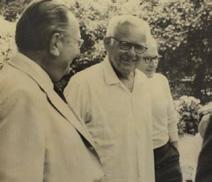
A team effort by Samantha Cosentino, Adán Griego, Héctor Hoyos, and Elizabeth Sáenz-Ackermann yielded key historical milestones. We consulted archives at Special Collections, Green Library, and the Hoover Institution.
CLAS Directors
Ronald Hilton [IHALBS Director] Romance Studies, 1944-1964
Antone Kimball Romney History, 1965-1966
John Johnson History, 1966-1972
Bernard Siegel Anthropology, 1972-1975
John D. Wirth History, 1975-1983
George A. Collier Anthropology, 1983-1990
Terry Karl Political Science, 1990-2001
Jim Fox Anthropology, 2001-2004
Herbert Klein History, 2004-2010
Rodolfo Dirzo Biology, 2010-2016
Alberto DíazCayeros
Freeman Spogli Institute, 2016-2023
Héctor Hoyos
Iberian and Latin American Cultures, 2023-present
Fun Fact: The house served as the Stanford Hypnosis Research Laboratory under the Department of Psychology in the years preceding CLAS’s tenancy.
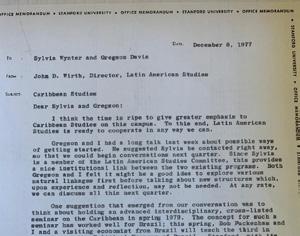
1978 The center receives a Latin American Studies Endowment.
1977 Building on a student-led Afro-Latin American film series, CLAS Director John Wirth strengthens collaboration between the center and a Caribbean studies initiative led by the influential thinker Sylvia Wynter, who taught at Stanford at the time.
1980 CLAS hosts the first of 137 Tinker Visiting Professors, including the esteemed Uruguayan writer Eduardo Galeano in 1993-94.
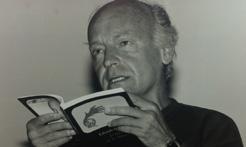
1989 The National Endowment for the Humanities matches funding in support of Latin American Studies programming.
1991

President Carlos Andrés Pérez of Venezuela donates a Biblioteca Ayacucho collection to the center.
2000 Shauna Harrison, “The Exportation of Unhealthy Ideas: The Influence of American Culture on Body Image in Costa Rica” M.A. Thesis — one of over 600 M.A. capstones in six decades!
2015
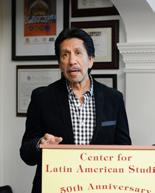
CLAS Director Rodolfo Dirzo celebrates CLAS’s 50th anniversary with a 2-day event with former foreign dignitaries and university officials.
2024 A snippet of daily life at the center: at a Friday Lecture, M.A. candidate Enru Zheng introduces Nathaniel Wolfson, assistant professor at UC Berkeley, before his presentation on Brazilian literature and critical theory.
2022 Under Alberto Díaz-Cayeros’s leadership and with CIESAS Unidad Regional CDMX, CLAS co-hosted the Ethnicity, Race, and Indigenous Peoples (ERIP) Conference at Casa de la Universidad de California in Mexico City.

2025 Autumn quarter 2025 marks the 60th anniversary of the center, one of the nation’s leading institutions devoted to the interdisciplinary study of the region. Join us on December 5, 2025, for a milestone event with panels, talks, and a celebration of scholarship.
CLAS WELCOMES THE CLASS OF 2026
LAS M.A. Students

Kimberly Arriaga-Gonzalez was born and raised in Delaware. She graduated from Salisbury University with a B.A. in Philosophy and English and a minor in Biology. Kimberly facilitated the public philosophy programs Philosophy for Children and the Eastern Correctional Institution Book Group. She was a recipient of a 2022-2023 Fulbright English Teaching Award for Peru, where she taught at Colegios de Alto Rendimiento. After receiving the 2024 Citizens Diplomacy Action Fund grant, she co-led the project “Entre río y bosque: Science Education Outreach in Madre de Dios, Peru.” Drawing from reflections on diasporic violence for her scholarship, Kimberly focuses on the importance of liberatory practices in creativity and how they manifest in storytelling. She is interested in restructuring conversations of the ancient world and bringing Greek philosophers into conversation with notorious Nahua works.

Arantza Caudillo Álvarez is originally from Puebla, Mexico, and moved to Florida during her early adolescence. She graduated summa cum laude from Florida State University (FSU) with a B.S. in International Affairs and Human Rights and Social Justice. Arantza focused her undergraduate career on immigration rights and interned at the FSU Center for the Advancement of Human Rights and the International Rescue Committee. Arantza directed the student-led organization After They Arrive, which helps immigrants through community service. She was named FSU’s Humanitarian of the Year and received the Betty Phifer award for her commitment to public service. Arantza completed an honors thesis titled “Moments of Freedom in Hidalgo, Mexico: Indigenous Women’s Networks of Production in the Sierra Otomí-Tepehua-Nahua.” She received fellowships to conduct research in Hidalgo with the nonprofit Psychology and Human Rights.

Diana Sarai Cisneros was born in Los Angeles, California, into a family with deep roots in Mesoamerica. She grew up in Detroit and majored in linguistics at Michigan State University, where she became interested in language preservation and revitalization. She works with
various communities in Latin America on this endeavor. In Ecuador, Diana co-founded Inka Shimi, the first Kichwa language school for all ages in Salasaka with Kichwa activist Micaela Jerez, and taught introductory Nawat to children in Texistepeque, El Salvador. Diana is committed to keeping Indigenous languages alive. She will apply her knowledge to collaborate and create an archive with Desarrollo Sostenible Para Guatemala (DESGUA), using digital tools for community-driven language preservation for K’iche’ and other Maya languages in Guatemala to maintain language and culture, including ancestral food, medicine, and oral traditions.

Myrka Odalis Cruz Aracen was born and raised in Columbus, Ohio. Myrka received a B.A.H. in Comparative Studies in Race and Ethnicity and a B.A in Sociology from Stanford. Her undergraduate thesis focused on diasporic Indigenous Oaxacan transborder connections and resistance in Ohio. As the daughter of Zapotec immigrants, Myrka’s lived experiences shape her dream of supporting immigrants and motivate her to advocate for Indigenous Latine people. She has dedicated herself to engaging with these communities by leading independent research, working with local diasporic nonprofit organizations, and co-founding a school group centering Indigenous Latine intersectionality.

Luca DeCola is from Cambridge, Massachusetts, and earned his associate’s degree from Bunker Hill Community College. With the Community College Academic Honors Scholarship, he transferred to the University of Massachusetts Amherst, completing his B.A. in History with a minor in Afro-American Studies. For his undergraduate senior thesis, he received the Potash Travel Grant for Latin America, allowing him to travel to Bogotá, Colombia. There, Luca interviewed survivors of the state-led elimination of 5,733 members and suspected sympathizers of the left-wing political group Unión Patriótica (UP). While living in Colombia after graduation, Luca researched the history of the UP and the country’s internal armed conflict, conducted archival research, and recorded oral histories with UP President Senator Aída Avella, the Colombian Ambassador to the United States Daniel García-Peña, and ex-combatants from the FARC guerrillas, among others.
THE YEAR AHEAD
CLAS WELCOMES THE CLASS OF 2026 (continued)

Lucía Huerta Torres was raised in Tijuana, Mexico. She earned a B.A. in Sociology from UC Berkeley to better understand the relationship between forced displacement, gender, and state violence. She volunteered with organizations in Tijuana that support the migrant community, such as Espacio Migrante and The Border Church. While at UC Berkeley, Lucía worked on a research project as a Ronald E. McNair Scholar, interviewing asylum-seeking mothers in Mexico awaiting admission into the U.S. Additionally, Lucía studied in Rio de Janeiro, Brazil, where she took various social science courses, including Anthropology of Violence, and participated in the Human Rights and Cultural Memory study abroad program in Argentina and Chile. Lucía is especially interested in researching how textiles have been used throughout Latin America to denounce and preserve the memory of human rights violations.
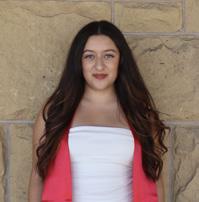
Lyzet Montañez Hurtado is a proud first-generation student from Clearlake, California. She earned her B.A. in Political Science from Stanford University, with a primary focus on Justice and Law and a secondary focus on Elections, Representation, and Governance. She also minored in Spanish and in Comparative Studies in Race and Ethnicity (CSRE). Lyzet brings a transnational lens to her studies, informed by her experiences visiting family in Mexico and studying abroad in Spain. Through the Just Transitions Policy Lab, she co-created a StoryMap highlighting the lived experiences of formerly unhoused Spanish-speaking individuals in Mountain View. She has also gained experience across multiple legal and advocacy settings, including roles at KPB Immigration Law Firm, the Instituto Internacional de Derecho y Medio Ambiente (IIDMA) in Spain, and most recently, as an intern at her local public defender’s office in Northern California.
2025-26 BOLÍVAR HOUSE VISITORS
Tinker Visiting Professors
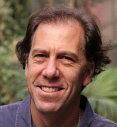
Juan-Pablo Montero
Pontificia Universidad Católica de Chile
Juan-Pablo Montero is a professor of Economics at the Pontificia Universidad Católica de Chile (PUC-Chile), distinguished visiting professor at Aalto University’s Business School, and research associate at MIT’s CEEPR. He received a bachelor’s and a master’s degree in Civil Engineering from PUC-Chile and a master’s and a doctoral degree in Economics from MIT. His research work concentrates on industrial organization, environmental and resource economics and has appeared in the American Economic Review, the Journal of Political Economy, the Review of Economic Studies, and the Journal of the European Economic Association, among others.

Alexandre Street
Pontifícia Universidade Católica do Rio de Janeiro
Alexandre Street holds master’s and doctoral degrees in Electrical Engineering (with an emphasis in operations research) from the Pontifical Catholic University of Rio de Janeiro (PUC-Rio), Brazil. He teaches Energy Economics for graduate students and Optimization and Statistics for both graduate and undergraduate students. He founded the Laboratory of Applied Mathematical Programming and Statistics (LAMPS) at PUC-Rio; the Renewable Storage and Flexibility Research Group for Power Systems Sustainability; and Lamps Co, an energy-tech startup incubated at PUC-Rio. Street is a senior member of the IEEE Power and Energy Society and a CNPq and FAPERJ research fellow.
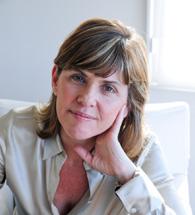
Mónica Szurmuk
Universidad Nacional de San Martín; National Scientific and Technical Research Council of Argentina (CONICET)
Mónica Szurmuk is a senior researcher at the National Scientific and Technical Research Council of Argentina, and a professor of Latin American Literature at the Universidad Nacional de San Martín where she chairs the M.A. program in Latin American Literatures. She is the author of Women in Argentina: Early Travel Narratives and La vocación desmesurada: Una biografía de Alberto Gerchunoff. She is the editor of the series Latin American Literature in Transition for Cambridge University Press. She is the lead investigator of the collective research-intervention project Intimate Cartographies in Community, which seeks to develop alternative, localized experiences of memory, trauma, and community in marginalized suburbs of Buenos Aires.
Luksic Visiting Scholars

Mayra Feddersen
Universidad Adolfo Ibáñez
Mayra Feddersen is an associate professor of Law at Universidad Adolfo Ibáñez in Santiago, Chile. She earned her Ph.D. in 2017 from the Jurisprudence and Social Policy Program at UC Berkeley School of Law, where she specialized in sociolegal studies and the governance of migration. Her research sits at the intersection of immigration policy, labor market integration, and the operation of legal and bureaucratic institutions, with a strong emphasis on South-South migration. She is a principal researcher at the MIGRA Millennium Nucleus, an interdisciplinary research center focused on the governance of migration in South America. She also serves as deputy director of the Center for the Study of Law and Society in Chile and board president of the Center for Migration Policy, where she helps foster dialogue between academic research and public policy.
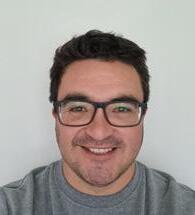
Carlos Manzano Universidad de Chile
Carlos Manzano was born in Quito, Ecuador, and is currently an assistant professor in the Department of Chemistry at the University of Chile. Carlos earned a bachelor’s degree in Chemistry from San Francisco University in Quito and completed a Ph.D. in Chemistry at Oregon State University, where he developed novel analytical approaches for processing environmental samples from highly polluted sites in the United States. His research focuses on the analysis of organic and inorganic trace contaminants. Manzano is particularly interested in investigating the chemical factors that shape the exposome of individuals living in urban and rural areas across Chile’s diverse and extreme environments, including the Atacama Desert, Patagonia, and Antarctica. He currently serves as president of the Chilean Society of Environmental Chemistry.
Tinker Postdoctoral Fellow
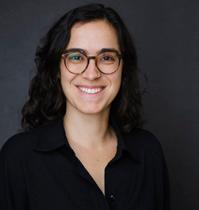
Clara Bicalho
University of California, Berkeley
Clara Bicalho (she/ela/ella) received her Ph.D. in Political Science from University of California, Berkeley. Her research examines topics in comparative politics, land governance, and political participation. Specifically, she is interested in understanding what leads to greater political inclusion in Latin America. Focusing on afrodescendent communities known as quilombos in Brazil, her dissertation work draws on original survey data and in-depth interviews to study the social and political factors that explain why and how some communities succeed in formalizing their rights to collective land. Clara is currently a non-resident research associate at the Center on the Politics of Development at UC Berkeley.
Tinker Dissertation Completion Fellows
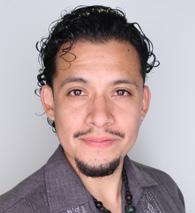
J. Rubén Díaz Vásquez
J. Rubén Díaz Vásquez is an interdisciplinary scholar of race, immigration, coloniality, performance, and literature in Chicanx and Mexican culture, with a specialization in Indigeneity. He is a Ph.D. candidate in Stanford’s Modern Thought & Literature Program. His dissertation studies the ubiquitous representations of Indigeneity in late 20th century poetry and cultural performances by Mexican-origin people on both sides of the border. His dissertation, tentatively titled “Between Tenochtitlan and CalifAztlan: Making Mexicanidad and the Poetics of Indigeneity, Performance, and Culture,” juxtaposes analyses of Chicanx and Mexican poetry with ethnographic observation of Aztec Dance in the Bay Area and Mexico City.
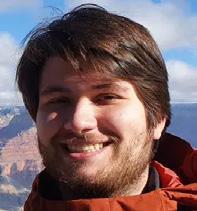
Olavo Passos de Souza
Passos de Souza is a Ph.D. candidate in Stanford’s History Department studying Latin American History and Transnational, International and Global History. His primary line of research focuses on early 19th century Brazil and the development of national identity and political structure within the nascent Brazilian nation. He is particularly interested in the history of ideas and the formation of new forms of governance. His dissertation, tentatively titled “Imagining an Empire: Constitutional Government and Federalism in Brazil, 1822-1842,” discusses the failed liberal project for Brazil in the wake of independence and the alternative path that his home nation might have followed.
2024-25 BOLIVAR HOUSE VISITORS
Tinker Visiting Professors

Ernesto Domínguez López
Universidad de la Habana
Ernesto Domínguez López is a full professor of History and Political Sciences at the Center for Hemispheric and United States Studies of the University of Havana in Cuba. He earned a doctoral degree in Nuclear Physics and is completing a research Ph.D. in Political Sciences at the University of Rostock in Germany. Domínguez López has worked on a variety of topics: knowledge capitalism; Cuba-U.S. relations; international relations; political theory and theory of history; Cuban history; Cuban foreign policy; populism and political polarization; research methodology in social sciences and non-linear systems; political economy; geopolitics; and U.S. politics. He has published over 70 articles and chapters and authored and edited six books on these topics. He has held visiting positions and fellowships at the University of Buckingham, the University of Rostock, the École des Hautes Études en Sciences Sociales, the University of Wisconsin-Madison, Arcadia University, and the Carter Presidential Center. He has also guest-lectured at approximately 30 universities in the United States, Latin America, and Europe. Professor Domínguez López co-taught HISTORY 178: Film and History of Latin American Revolutions and Counterrevolutions in winter quarter 2025 with Professor Mikael Wolfe and taught HISTORY 376: Populism in the Americas in spring quarter 2025.
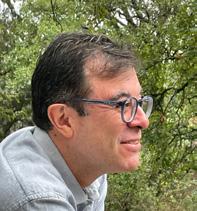
Sergio Ugalde Quintana
El Colegio de México
Sergio Ugalde Quintana is a professor at the Center for Linguistic and Literary Studies at El Colegio de México. His research and teaching interests are 20th-century Latin American essays and poetry, seen from the perspective of intellectual history. He holds a Ph.D. in Hispanic literature from El Colegio de México and a habilitation in Romance literatures and languages from the University of Potsdam, Germany. Ugalde has been a visiting professor at the Universidad de la República (Uruguay) and at the Universidade Federal do Paraná (Brazil). From 2007 to 2019, he was a professor of Latin American literature at the Facultad de Filosofía y Letras of the Universidad Nacional Autónoma de México, where he directed the School of Latin American Studies for three years. He has been a fellow in Germany thanks to funding from the DAAD and the Humboldt Stiftung. He is a member of Mexico’s National System of Researchers and has edited 11 books, including collective volumes, epistolary works, and text rescues. His publications include La biblioteca en la isla: Una lectura de la expresión americana de José Lezama Lima (Colibrí, 2011) and Filología, creación y vida: Alfonso Reyes y los estudios literarios (El Colegio de México, 2024). Professor Ugalde taught ILAC 168: Nature, Landscape, and Catastrophes in Mexican Literatures of the 20th and 21st Centuries in winter quarter 2025.
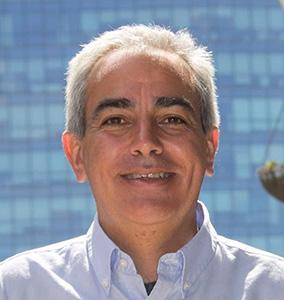
Julio Elías
Universidad del CEMA
Julio Elías is a professor in the Department of Economics and Business School at Universidad del CEMA (UCEMA), Argentina. He serves as the executive director of the UChicago/UCEMA Joint Initiative for Latin American Experimental Economics, director of the Master of Arts in Economics program, and director of the Center for Creativity Economics at UCEMA. He earned his Ph.D. in Economics from the University of Chicago. His research focuses on organ donation, exploring financial incentives, strategies to alleviate organ shortages, and the associated moral aspects and has also analyzed the role of cultural identity and how celebrating local culture can set products apart and inspire innovation. His research has been disseminated in journals including the American Economic Review, the Journal of Economic Perspectives, the Journal of Economic Behavior and Organization, PLOS One, and World Medical & Health Policy ; in book chapters; and has generated productive discussion in media outlets such as The Wall Street Journal and The New York Times He co-edited a collection of Gary Becker’s writings, published by the University of Chicago Press in 2023. Professor Elías taught ECON 104: The Economics of Innovation and Organ Donation in Latin America in spring quarter 2025.
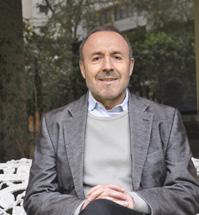
Jaime Araos
Universidad
de Chile
Jaime Araos has researched Greek philosophy, addressing issues in logic, metaphysics, and ethical and political philosophy related to democratic theory. His work explores the metaphysical and epistemological assumptions of liberal democracy, the role of tolerance in the modern state, and the crisis of representation in contemporary democracy. He has been a full professor of philosophy at UMCE, the Universidad de Chile, and the Pontificia Universidad Católica de Chile. He has served as a visiting professor at the Università degli Studi di Padova, Aix-Marseille Université, Universidad Complutense de Madrid, and the Graduate Program in Bioethics at Universidad de Chile, where he teaches Aristotelian ethics. He holds a Ph.D. from the Universidad de Navarra and is the author of over fifty specialized articles and six books, including Racionalidad política, virtudes públicas y diálogo intercultural (2017) and Amor a la sabiduría: Estudios de Metafísica y Ética en homenaje al Profesor Juan de Dios Vial Larraín (2004). Professor Araos conducted research in winter quarter 2025 and taught PHIL 215A: Ancient Democratic Theory and Contemporary Problems of Latin American Democracy in spring quarter 2025.
Luksic Visiting Scholars

Ana Figueiredo
Universidad de O’Higgins
Ana Figueiredo is a psychologist and holds a Ph.D. in Social Psychology (Universidade de Coimbra, Portugal, in collaboration with the Universiteit van Amsterdam, the Netherlands). She is an associate professor at the Universidad de O’Higgins and an associate researcher at the Center for Social Conflict and Cohesion Studies (Chile). She is a co-researcher for projects in Chile and Portugal and completely a project funded by the Chilean National Agency for Research and Development titled “Postcolonial ideologies, politics of recognition and reparation, and current intergroup relations: The Mapuche in Chile” as the principal investigator. Figueiredo is co-editor-in-chief at the Journal of Social and Political Psychology and part of the editorial council of the International Journal of Psychology and Public Policy. Additionally, she is on the editorial board of the journal Analyses of Social Issues and Public Policy and a consulting editor of the British Journal of Social Psychology. Her main areas of interest are collective memory, ideology, historical conflicts, intergroup relations, citizen-police interactions, violence, and collective action.

Juan Matta
Universidad Diego Portales
Juan Matta is an applied microeconomist with research interests in the economics of education, gender, and inequality. He holds a Ph.D. in Public Administration from NYU and is currently an assistant professor of economics at Universidad Diego Portales, where he teaches intermediate microeconomics, impact evaluation, and labor economics. He is the recipient of a Fondecyt grant for the project “Educación y movilidad social en Chile.” His publications include the 2021 article “Walking in Your Footsteps: Sibling Spillovers in Higher Education Choices” for the Economics of Education Review.
Nabuco Visiting Scholar
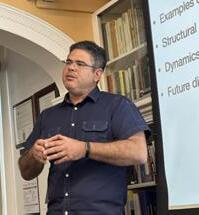
Paulo Roberto Guimarães Junior Universidade de São Paulo
Paulo Guimarães is a full professor of Ecology at the University of São Paulo, Brazil. His research focuses on understanding the origin, maintenance, and fragility of interaction patterns observed in species-rich ecological assemblages in terms of ecological and evolutionary processes operating at different scales. His research combines empirical data on ecological interactions, information on the natural history of interacting species, mathematical modeling, and network science. Much of his work centers on the structure of these ecological networks, particularly involving interactions between plants and animals in tropical ecosystems. He has contributed to identifying general patterns in ecological networks, exploring the consequences of these patterns for coevolution and conservation biology, and introducing new ways of characterizing interaction patterns in ecological systems. His academic background encompasses biology, ecology, statistical mechanics, and evolutionary biology.
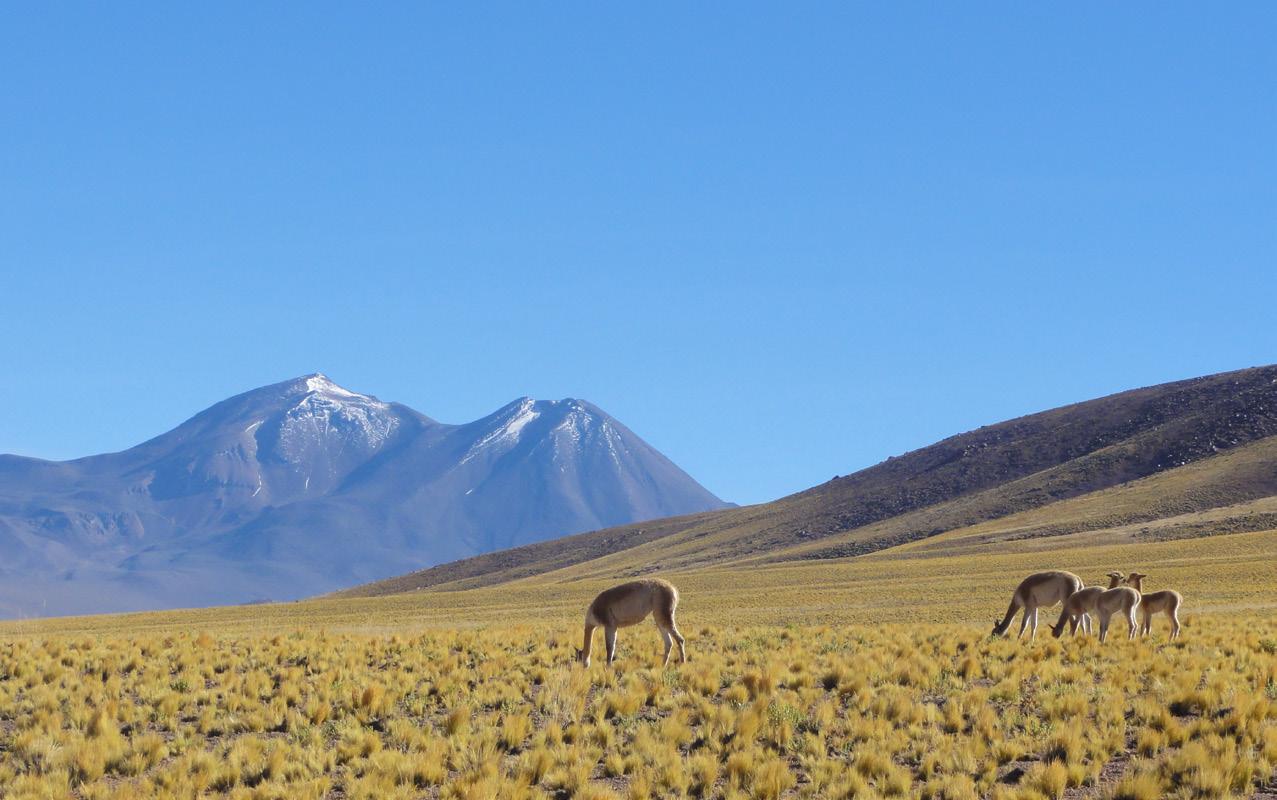
Kevin Diau captured this photo of the Atacama Highlands in Chile, 2013.
FACULTY & ACADEMIC AFFILIATE NEWS & PUBLICATIONS
Fernando Alarid-Escudero won the Rosenkranz Prize for his public health efforts in Mexico designing a national colorectal cancer screening program for those most at risk. Dr. Alarid-Escudero also won a Stanford Impact Lab Stage 1 award to explore the practicality of introducing a simple and affordable colorectal screening test, the fecal immunochemical test (FIT), in Chile. By conducting a feasibility study, his team aims to deliver the evidence policymakers require to know how best to reduce the life-threatening burden of colorectal cancer across the country.
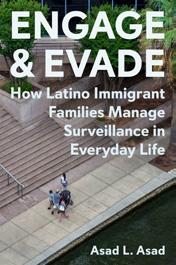
Asad L. Asad’s book Engage and Evade: How Latino Immigrant Families Manage Surveillance in Everyday Life (Princeton UP, 2023) won the following awards: Mirra Komarovsky Book Award, Eastern Sociological Society; Distinguished Book Award, Pacific Sociological Association; Distinguished Book Award, Sociology of Law Section, American Sociological Association (ASA); Best Book in Current Events (Gold Medal), Independent Publishers Book Awards; Best First Book-Non-Fiction (Silver Medal), Independent Publishers Book Awards; and Order of the Coif Book Award (Finalist). Professor Asad’s article, “Deportation Threat Predicts Latino US Citizens and Noncitizens’ Psychological Distress, 2011-2018” (Proceedings of the National Academy of Sciences of the United States of America, 2024) won two awards: Best Publication Award, Mental Health Section, ASA; and IPUMS Health Surveys Best Published Research Award. In recognition of his contributions to teaching, mentoring, and advising, he won the CCSRE Faculty Recognition Award. His latest publication is “Spatial and Temporal Contexts of Formal Social Control and System Involvement: U.S. Latinos under Immigration Policing” (Law & Society Review; 2025, 59: 172-208).
Rodolfo Dirzo was recently appointed as the Sapp Family University Fellow in Undergraduate Education and further recognized with the BBVA Frontiers of Knowledge Award in Ecology and Conservation Biology, BBVA, Bilbao, Spain, 2024. In collaboration with Mexico’s National Commission for Biodiversity (CONABIO), Dr. Dirzo is running a national-level analysis of the disturbance of biodiversity on zoonotic risks, involving local communities and Indigenous Peoples from across the country. He co-authored “Brazil is on Fire: Igniting Awareness of the 2024 Wildfire Crisis” (Journal of Environmental Management ; 2025) and “Elevating Local Perspectives for Equity in Ecological Research” (Scientific Life; 2025).

Elizabeth M. Grávalos was appointed Assistant Professor of Anthropology. She specializes in the Andes and material science applications in archaeology.
Héctor Hoyos delivered the Baldwin Dahl Lecture at the Department of Comparative Literature at Yale University. He co-authored the book chapter “The Material Turn in Latin America” in New Approaches to Latin American Studies (Palgrave, 2025) and co-edited the special issue “Anticolonial Interventions in Legal Culture: Global South Art and Jurisprudence” (Occasion; 2025, 14).
Tomás Jiménez , Professor of Sociology, has been appointed Joan B. Ford Professor, effective April 29, 2025 (Endowed).
Beatriz Magaloni, Graham H. Stuart Professor of International Relations and Senior Fellow at the Freeman Spogli Institute, received the 2024 Boris Mintz Institute (BMI) Prize for her work on authoritarian politics and its global resurgence. The BMI Prize is presented
annually to an exceptional individual who has devoted their research and academic life to solving a strategic global challenge. The international jury recognized her contributions as a key pillar for how subsequent scholars have come to understand and study electoral autocracies and the most insidious threats to democracy in the contemporary period.
Ana Raquel Minian, Associate Professor of History, received the 2025 PEN America John Kenneth Galbraith Award for Nonfiction for her book In the Shadow of Liberty: The Invisible History of Immigrant Detention (Viking, 2024), which traces the origins and evolution of the U.S. immigrant detention system from the 1800s to the present. PEN recognized how Minian captures the circumstances that drive people to seek a new life in a new land, and the xenophobia that greets them at the border.
John Rick co-authored the article “Pre-Hispanic Ritual Use of Psychoactive Plants at Chavín de Huántar, Peru” for Proceedings of the National Academy of Sciences of the United States of America; 2025, 122, 19.
Patricia Rodriguez Espinosa, whose research centers on advancing the science of participatory research methods, recently published two Spanish measures for evaluating research community-academic partnerships and outcomes. Developed in partnership with community organizations in mainland U.S., Puerto Rico, and Nicaragua, these measures can further strengthen community-engaged research involving Latino/a/x communities within the U.S., Latin America, and globally. She co-authored “The Spanish Translation, Adaptation, and Validation of a Community-Engaged Research Survey and a Pragmatic Short Version: Encuesta Comunitaria and FUERTES” (Journal of Clinical and Translational Science; 2024, 8, 1, e165).
Aliya Saperstein co-authored the article “Racial Classification as a Multistate Process“ for Demographic Research; 2024, 50, 15: 457-472.
TITLE SPONSORED RESEARCH & LEARNING OPPORTUNITIES
FACULTY FUNDING RECIPIENTS
Fellowships
CLAS Faculty-Led Events Grants
These grants enable Stanford faculty to organize academic fora that bring together scholars from Stanford and the Americas to exchange cutting-edge research and explore shared intellectual concerns. Funding supports conferences, workshops, and symposia to foster meaningful scholarly dialogue and collaboration across institutions.
“Exploring the Rise of Judicial Activism in Brazil”
September 23, 2024
• Stephen Kotkin, Senior Fellow, Freeman Spogli Institute for International Studies “Gender and Violence: A Workshop on Research and Practice”
May 8-9, 2025
• Beatriz Magaloni, Graham H. Stuart Professor of International Relations, Political Science; Senior Fellow, Freeman Spogli Institute for International Studies
“Forced disappearances, violence and indigenous territorial autonomy, a perspective from Other Knowledges (Otros Saberes) in Latin America”
May 21-22, 2025
• Alberto Díaz-Cayeros, Senior Fellow, Freeman Spogli Institute for International Studies; Professor, by courtesy, Political Science
Stanford-Tinker Faculty Research Fund
CLAS is pleased to announce the recipients of the 2024-25 Stanford-Tinker Faculty Fund, made possible by the generous support of the Tinker Foundation. This fund enhances Stanford faculty scholarship and student engagement while advancing knowledge about Latin America.
• Nicole Ardoin, Associate Professor, Environmental Social Sciences; Senior Fellow, Woods Institute for the Environment
“Challenging the global fisheries management paradigm in Galápagos”
• José Ignacio Cuesta, Assistant Professor, Economics
“Designing Public Policies to Increase Drug Affordability and Access in Latin America”
• Gabrielle Hecht , Professor, History; Professor, by courtesy, Anthropology “Inside-out Earth”
The Cuba Observatory
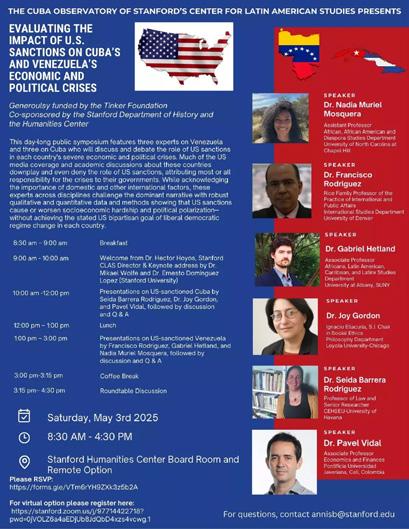
The Cuba Observatory is a CLAS initiative to further the interdisciplinary study of the eponymous island nation, a hemispheric linchpin.
Director 2025-26:
• Lisa Surwillo, Associate Professor, Iberian and Latin American Culture
Director 2024-25:
• Mikael Wolfe, Associate Professor, History; Director of Graduate Studies, Center for Latin American Studies
Student Coordinator 2024-25:
• Annís Barron, M.A., Latin American Studies, ’25
• Héctor Hoyos, Professor, Iberian and Latin American Cultures and, by courtesy, Comparative Literature
“García Márquez as Law: Stateless Statesmanship and the Global Affective Community of World Literature”
• Nicole T. Hughes, Assistant Professor, Iberian and Latin American Cultures
“Staging History: The Theatrical Invention of New Spain and Brazil in the Sixteenth Century”
• James Holland Jones, Professor, Environmental Social Sciences; Senior Fellow, Woods Institute for the Environment
“Social Network Structure for Agricultural Development: Evidence from the Irrigation Sector in Bolivia”
SPONSORED RESEARCH & LEARNING OPPORTUNITIES
CLAS offers research grants and fellowships, internships, scholarships, language study programs, and other funding options to students, faculty, and visiting scholars both in the United States and abroad. The map below is a visual representation of the student research, study, and internships carried out in the U.S., Latin America, and the Caribbean.
Rubén Díaz Vásquez, Raina Moseley, Jaime Landinez Aceros, Karen Hoshino, Annís Barron, Fabián Carchi Fabiola Cruz Li, Chenyu Deng, Yuritzi Estrada, Botao He, María de las Mercedes Martínez Milantchi, Giácomo Rabaiolli Ramos, Christian Robles-Baez, Brandon Rubio, Esteban Salmón Perrilliat, Rebeca Santa Maria Granados, Xinwen (Enru) Zhang, Rachel Zila, Paola Parra, Solange Melissa Severino de Oliveira, Kallie White, Isabel Calero Forero United States
Luisa Genes, Fabián Carchi, Brandon Rubio Mexico
Matthew Randolph, Annís Barron Dominican Republic
Kelsey Freeman Guatemala
Bryn Evans, Sergio Sánchez López, Edgar (TJ) Francisco Colombia
Karen Rojas, Shirley Jennifer Serrano Rojas, Mariana Calvo Peru
Mariana Calvo Argentina
Brazil
Christian Robles-Baez Uruguay
Joaquin de la Luz Abarca, Maren Beauchamp, Davi Fereira Veronese, Rodrigo Béllo Carvalho, Xinwen (Enru) Zhang, Rachel Zila
STUDENT FUNDING RECIPIENTS
Fellowships
Ayacucho Fellowship
The Ayacucho Fund was established with a generous gift from the Gran Mariscal de Ayacucho Foundation to award fellowships to graduate students at Stanford University.
• Fabiola Cruz Li, M.A., Latin American Studies, ’25
• Solange Melissa Severino de Oliveira, M.A., Latin American Studies, ’24
Foreign Language and Area Studies (FLAS) Fellowship
CLAS administers FLAS fellowships for graduate and undergraduate students pursuing language training in less commonly taught languages of Latin America. FLAS fellowships are made possible with funding from the U.S. Department of Education under the auspices of Title VI of the Higher Education Act of 1965.
Academic Year 2024-25
Haitian Creole, Stanford University
• Annís Barron, M.A., Latin American Studies, ’25
Nahuatl, Stanford University
• Yuritzi Estrada, M.A., Latin American Studies, ’25
• Rebeca Santa Maria Granados, M.A., Latin American Studies, ’25
Portuguese, Stanford University
• Fabián Carchi, M.A., Latin American Studies, ’25
• Paola Parra, M.A., Latin American Studies, ’25
• Brandon Rubio, M.A., Latin American Studies, ’25
• Kallie White, M.A., Latin American Studies, ’25
• Rachel Zila, M.A., Latin American Studies, ’25
Summer 2025
Nahuatl, University of Utah Nahuatl Language and Culture Program, Utah, U.S.A.
• Rubén Díaz Vásquez, Ph.D., Modern Thought and Literature, ’26
Portuguese, University of Florida Language and Culture Program, Rio de Janeiro, Brazil
• Maren Beauchamp, Ph.D., Iberian & Latin American Culture, ’30 Middlebury Language Schools, Vermont, U.S.A.
• Raina Moseley, B.A., Communication, ’26
The Hugh and Josephine Knotts Knowles Fellowship
The Knotts Knowles Fellowship Fund was established with a generous gift from Josephine Knotts Knowles and Hugh Knowles to provide fellowships to Latin American Studies graduate students at Stanford University.
• Isabel Calero Forero, M.A., Latin American Studies, ’24
• Yuritzi Estrada, M.A., Latin American Studies, ’25
• Paola Parra, M.A., Latin American Studies, ’25
Soares Fellowship
The Soares Fund was established with a generous gift from Edward J. and Margaret S. Soares to provide fellowships to Latin American Studies graduate students at Stanford University.
• Annís Barron, M.A., Latin American Studies, ’25
• Brandon Rubio, M.A., Latin American Studies, ’25
• Rebeca Santa Maria Granados, M.A., Latin American Studies, ’25
CLAS Internship Grants
Monica Miller Walsh Internship Grants
Thanks to the renewed generosity of Stanford alumna Monica Miller Walsh and her husband David Walsh, CLAS has been transforming undergraduate experiences through immersive internships across Latin America since 2004.
Paraná & Curitiba, Brazil
• Joaquin de la Luz Abarca, B.A., Science, Technology, & Society, ’26; M.A., Sustainability Science and Practice, ’28
Your Gift Matters
Support from alumni, affiliates, families, and friends advances our academic community and ensures continued leadership in Latin American Studies. Scan this code to learn how you can contribute.

SPONSORED RESEARCH & LEARNING OPPORTUNITIES
Student-Led Working Group Grants
CLAS supports dynamic student-led working groups through competitive grants that bring together graduate students and faculty sponsors to create impactful events — lectures, speaker series, symposia, collaborative research projects, and scholarly exchanges. For the 2024-25 academic year, CLAS awarded two working groups grants for in-person and hybrid programming:
Cafecito Quechua
Cafecito Quechua promotes the learning of the Quechua language and builds community at Stanford University and its surroundings. Cafecito Quechua promotes Andean issues and cultures, inviting members to share their experiences with the region.
Student Coordinators:
• Annel Andrea Leon Tenorio, B.S.H., Bioengineering, ’26
• Caroline Bailey, Ph.D., English, ’27
Faculty Sponsor:
• Marisol Necochea, Quechua Instructor, Stanford Language Center
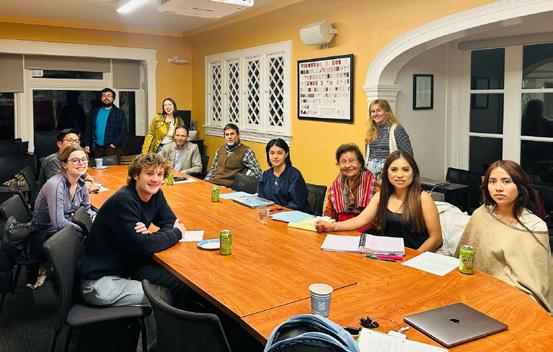


Latin America and Caribbean Working Group
Based in anthropology, the Latin America and Caribbean Working Group responds to the disparity between the number of Stanford scholars whose research focuses on Latin America and the quantity of graduate students whose field sites, research, and theoretical interest are rooted in the region.
Student Coordinators:
• Zaith Lopez, Ph.D., Anthropology, ’28
• Víctor Manuel Márquez Padreñan, Ph.D., Anthropology, ’27
Faculty Sponsor:
• Angela Garcia, Professor, Anthropology

Scan this QR code to learn about CLAS opportunities for students.
Sasha Chanko captured this photo “Desert Tracks” in Colombia, 2020.
Conference Travel Grants
CLAS provides funding to Stanford graduate students to present their Latin America-focused research at professional meetings and conferences. These grants help emerging scholars share their work, build professional networks, and advance their careers through academic exchange.
VIII Congreso Latinoamericano de Historia Económica, Montevideo, Uruguay
• Christian Robles-Baez, Ph.D., History, ’26

Professor Carlos Gabriel Guimarães from Universidade Federal Fluminese and Christian Robles-Baez at the conference in Uruguay.

American Anthropological Association (AAA) Annual Meeting, Tampa, Florida, U.S.A.
• Jaime Landinez Aceros, Ph.D., Anthropology, ’25
Annual Meeting of the Association of Tropical Biology and Conservation, Oaxaca de Juárez, Oaxaca, Mexico
• Luisa Genes, Ph.D., Biology, ’26
Comparative and International Education Society (CIES) Conference, Chicago, Illinois, U.S.A.
• Karen Hoshino, M.A., Education, ’26
Latin American Studies Association (LASA) Congress, San Francisco, California, U.S.A.
• Annís Barron, M.A., Latin American Studies, ’25
• Fabián Carchi, M.A., Latin American Studies, ’25
• Fabiola Cruz Li, M.A., Latin American Studies, ’25
• Chenyu Deng, M.A., Latin American Studies, ’25
• Yuritzi Estrada, M.A., Latin American Studies, ’25
• Botao He, M.A., Latin American Studies, ’25
• María de las Mercedes Martínez Milantchi, Ph.D., Anthropology, ’28
• Giácomo Rabaiolli Ramos, M.A., Education, ’26
• Christian Robles-Baez, Ph.D., History, ’26
• Brandon Rubio, M.A., Latin American Studies, ’25
• Esteban Salmón Perrilliat, Ph.D., Anthropology, ’25
• Rebeca Santa Maria Granados, M.A., Latin American Studies, ’25
• Xinwen (Enru) Zhang, M.A., Latin American Studies, ’25
• Rachel Zila, M.A., Latin American Studies, ’25
GRADUATE FIELD RESEARCH GRANTS SPONSORED RESEARCH & LEARNING OPPORTUNITIES
Fueled by endowments including the Tinker Foundation, CLAS offers two distinct graduate research opportunities: Tinker Graduate Field Research Grants support preliminary field exploration across Latin America, while CLAS Graduate Field Research Grants enable advanced fieldwork for deeper academic investigation. Together, these programs empower students to conduct transformative research through cultural immersion and hands-on discovery in the region.
Tinker Graduate Field Research Grants
Brazil
• Rodrigo Béllo Carvalho, Ph.D., Biology, ’29
“Consequences of Historical and Contemporary Defaunation: A Cross-continental Comparison of Megafauna’s Seed Dispersal Role in African and Neotropical Savannas”
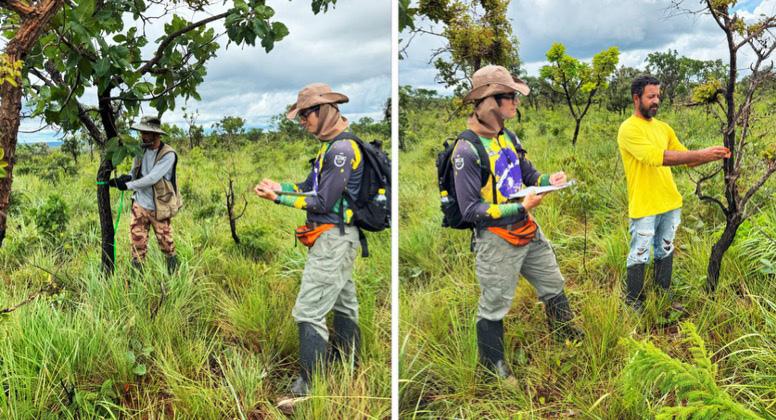
• Xinwen (Enru) Zhang, M.A., Latin American Studies, ’25
“Immigrants as Fourth Mestizo: Cultural Integration and Identity Construction in Brazilian Literature”
• Rachel Zila, M.A., Latin American Studies, ’25
“Social Entrepreneurship Initiatives in Rio and São Paulo”
Colombia
• Edgar (TJ) Francisco, Ph.D., Earth System Science, ’29
“Evaluation of Reptile, Amphibian, Bird, and Mammal Diversity and Habitat Use in AKAE Biological Preserve”
Dominican Republic
• Annís Barron, M.A., Latin American Studies, ’25
“Que viva el bajo mundo: Dembow, Racialization, and Subalternity in Capotillo, Santo Domingo”
Mexico
• Fabián Carchi, M.A., Latin American Studies, ’25
“Unknown Dichotomies of the Public Domain: The Case Of FIBRA-E in Creating Economic Development and Fostering Inequality in Mexico (2016-2024)”
• Brandon Rubio, M.A., Latin American Studies, ’25
“Lucha Libre as a Canvas for Subversive Art in Mexico City”
Peru
• Karen Rojas, M.A., Anthropology, ’28
“Examining the Dynamic between Social Memory and Presentday Identity in Highland Peru”
• Shirley Jennifer Serrano Rojas, Ph.D., Biology, ’27
“Adaptation in a Changing World: Exploring the Evolutionary Mechanisms of Adaptation to Environmental Change in Tropical Ecosystems”
United States
• Rebeca Santa Maria Granados, M.A., Latin American Studies, ’25 “The Promises and Results of Populism: Tlaxcala’s Public Health Services under Andrés Manuel López Obrador”
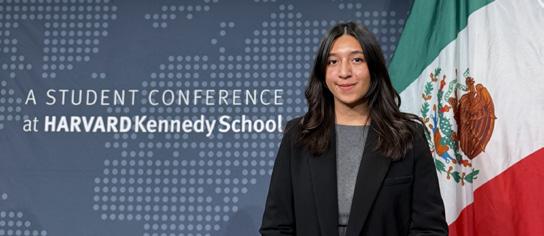
Various: Argentina and Peru
• Mariana Calvo, Ph.D., History, ’27
“The Empire That Never Left: European Capital and the Business of Sovereignty in Post-Independence Latin America”
CLAS Graduate Field Research Grants
Brazil
• Davi Fereira Veronese, Ph.D., Political Science, ’30
“The Political Economy of Deforestation in Decentralized Democracies: Building Evidence from Brazilian Municipalities”
Colombia
• Bryn Evans, Ph.D., Art & Art History, ’29
“Choreographing a New Breath / a Retreat / to be Free: The Embodied Wisdom of African Diasporic Dance Traditions in Latin America’s Freetowns”
• Sergio Sánchez López, Ph.D., Environment and Resources, ’27
“Socializing and Communicating Results with the Communities: Peatlands Actionable Knowledge”
Dominican Republic
• Matthew Randolph, Ph.D., History, ’25
“Mapping Black Ecologies in Samaná Bay”
Guatemala
• Kelsey Freeman, M.A., International Policy, ’25; M.S., Environment and Resources, ’25
“UNSTUCK: Understanding the Drivers, Obstacles, and Systems behind Climate-Induced Migration”
TINKER DISSERTATION COMPLETION FELLOWSHIPS

Christian Robles-Baez
During the 2024-25 academic year, Christian Robles-Baez advanced his dissertation project, “The Making of an Improbable Global Market: Coffee (1808-1850),” with the support of the Tinker Dissertation Completion Fellowship awarded by the Tinker Foundation through CLAS. His research explores how coffee transitioned from a luxury good into a mass commodity, becoming one of the world’s most valuable markets during the early 19th century. Combining multi-scalar analysis with interdisciplinary methods, his dissertation examines not only the socioeconomic structures but also the practical tools, knowledge systems, and material infrastructures that enabled the emergence and consolidation of the coffee market reshaping both local economies and global trade.
Christian’s CLAS fellowship year benefited from engaging conversations with visiting scholars and colleagues across disciplines and offered him the opportunity and support to co-organize two events. The first was a symposium titled “Commodity Markets in the History of Capitalism and Economic Growth,” which brought together presenters from Stanford and other U.S. institutions and featured diverse case studies on coffee, milk, sugar, hay, yerba mate, and enslaved people — each central to 19th-century economies. The symposium explored not only how these markets created wealth, innovation, and integration but also how they contributed to environmental degradation, inequality, and political asymmetries. The second event was the lecture by Brazilian scholar Clemente Penna “An Enslaved Credit Market: Contract Law and Credit Circulation in 19th Century Rio de Janeiro,” which examined the entanglement of credit markets and slavery in Brazil and generated rich comparisons with other contexts, including the United States.
While a CLAS fellow, Christian mentored four M.A. students whose projects addressed topics including social work with Latin American immigrants, food security and education policy, private investment in public infrastructure, and Brazilian immigrant literature, a rewarding experience which allowed him to follow their progress and support their research throughout the year.

Esteban Salmón Perrilliat
For Esteban Salmón Perrilliat, Bolívar House was a grounding place where the CLAS community provided a steady center throughout his doctoral studies. The backbone of academic and social life at CLAS was the Friday Lecture Series that brought together the community to explore Latin America through a broad, interdisciplinary lens, encompassing the humanities, social sciences, and natural sciences. Esteban found that the national origin and institutional affiliation of the speakers were as diverse as their scholarly interests, and the informal conversations before and after the lectures brought him some of his closest friends at Stanford. The CLAS visiting professor program also enriched Esteban’s early years as a doctoral student. He participated in workshops led by visiting professors and writers Cristina Rivera Garza and Juan Villoro, both of whom profoundly shaped the way he reads and writes.
CLAS was a source of support through grants for Esteban’s ethnographic fieldwork among criminal prosecutors and criminalized populations in Mexico City; for the presentation of this research at conferences in Princeton, Bogotá, and San Francisco; and for his participation in the Latin American Summer School on Social Issues in Arica, Chile. As a Tinker Dissertation Completion Fellow, Esteban not only received support to complete his dissertation but was assigned a desk at Bolívar House and served as a peer mentor to MA students in the Latin American Studies program. This support also made possible the postdoctoral position he will begin next year at Brown University.
As a peer mentor, Esteban had the opportunity to witness the M.A. students develop fascinating and rigorous research projects and embody the interdisciplinary and multi-method scholarship that defines CLAS: from archival research in Brazil and anthropological fieldwork in San Jose to literary analysis of Peruvian novels and statistical evaluations of public policy in Mexico. Esteban credits CLAS for shaping him as both a Latin American and a Latin Americanist scholar and for cultivating the commitment — and the expertise — to bring a Latin Americanist perspective to broader academic conversations and to situate those conversations meaningfully within Latin America.
EVENT HIGHLIGHTS
FRIDAY LECTURE SERIES
CLAS’s Friday Lecture Series is a space for scholars and the general public to learn about cultural, educational, artistic, and scientific developments in Latin America. Some lectures are livestreamed and available on the CLAS YouTube channel.
Fatoumata Seck
Stanford University
September 27, 2024
“Suzanne Comhaire-Sylvain: Legacies and New Directions”
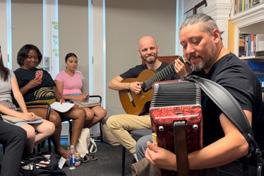
Alejandro Brittes
Composer Researcher, Author, Musician
October 4, 2024
“El origen del Chamamé: Una historia para ser contada”
Kathleen López
Rutgers University
October 11, 2024
“Afro-Asian Solidarity and Conflict in Latin American and Caribbean Labor and Liberation Movements”
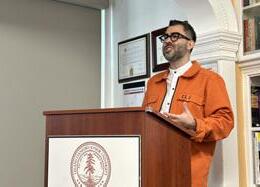
Héctor Beltrán
Massachusetts Institute of Technology
October 18, 2024
“Code Work: Hacking across the US/México Techno-Borderlands”
Ana Figueiredo
Universidad de O’Higgins
October 25, 2024
“Collective Memories, Postcolonial Ideologies and Present-day Conflicts: The Mapuche in Chile”
Lisa Surwillo
Stanford University
November 15, 2024
“Creole Women and Human Trafficking: The Case of Manuela Xiqués”
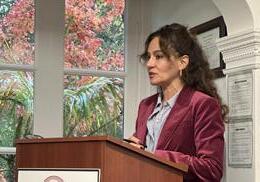
Rosaura Martínez Ruiz
Universidad Nacional Autónoma de México
November 22, 2024
“Antigonía como duelo agonístico: Una tercera economía psíquica de la pérdida”
Paulo Roberto
Guimarães Junior Universidade de São Paulo
January 10, 2025
“The Ecological Networks Shaping Biodiversity in Tropical Ecosystems of Latin America”
Ernesto Domínguez
López
Universidad de la Habana
January 17, 2025
“U.S.-Cuban Relations: Before and After a Watershed Election”
Sergio Ugalde Quintana
El Colegio de México
January 24, 2025
“Literatura y Antifascismo: Efraín Huerta, José Revueltas y Pablo Neruda en el diario el Popular (1939-1943)”

Juan Rafael Valdez
Stanford University
January 31, 2025
“Vagando a voluntad entre el ensayo y la naturaleza”
João Pina
Documentary Photographer February 14, 2025
“Operation Condor: Eliminating Political Opposition in South America”
Roxanna Altholz
UC Berkeley School of Law
February 28, 2025
“Justice and Resistance: Human Rights Violations Against Indigenous People in Latin America – The Case of Berta Cáceres”
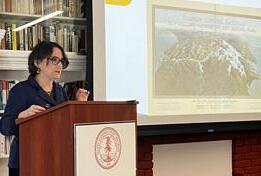
Marixa Lasso
Centro de Investigaciones
Históricas Antropológicas y Culturales de Panamá
March 7, 2025
“Erased: The Untold Story of the Panama Canal”
Paulina Alberto
Harvard University
April 4, 2025
“Finding Florentina: Popular Representations and Legal (Self-)Presentations of an Afro-Argentine Woman in Turn-of-the-Century Buenos Aires”
Nathaniel Wolfson
UC Berkeley April 11, 2025
“Concrete Encoded: Poetry, Design and the Cybernetic Imaginary in Brazil”
Julio Elías and Juan Matta
Universidad del CEMA and Universidad Diego Portales April 18, 2025
“The Economics of Kidney Transplantation in Latin America” and “The Importance of Peers in Education: Evidence from Chile”
Jessica S. Samuel
Washington University in St. Louis
April 25, 2025
“American Madness: Virgin Lands, National Parks and Colonial Myths”
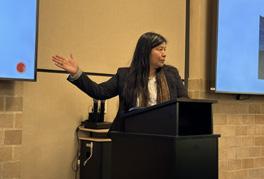
Gloria Elizabeth Chacón
UC San Diego
May 2, 2025
“Maya Cosmologies and Philosophies in the Diaspora”

Sergio Missana
Stanford Bing Overseas Studies
May 9, 2025
“Hope and Resilience: Lessons from the Climate Parliament for Latin America, Africa and South Asia”
Jaime Araos
Universidad de Chile
May 30, 2025
“Democracy in Latin America: Critical Reflections”
Below are a few of the diverse events that CLAS organized, sponsored, co-sponsored, and/or funded during the 2024-25 year.
October 11, 2024
Labor and Liberation Across the Atlantic Symposium
This event was a collaboration between SGS centers. It was sponsored by Stanford Global Studies’ Oceanic Imaginaries, a multiyear initiative that adopts the world’s oceans as an analytical framework for advancing cross-regional, interdisciplinary research and activities addressing timely global topics.


April 25, 2025
Spring Fiesta 2025: Caribbean Rhythms
This year’s annual CLAS social event, co-sponsored with the Stanford Cuba Observatory, celebrated the rich culture of the Caribbean with delicious Cuban food and live music by Grammy-nominated artist Yeny Valdez and the Team Bahia Music Band. CLAS staff, faculty, students, colleagues, and friends gathered at Bolívar House for dancing and good company.
May 1, 2025
The Power of Long-View Leadership: A Conversation with Juan Manuel Santos, Former President of Colombia and Nobel Peace Prize Laureate
A packed CEMEX auditorium welcomed the statesman, in conversation with former CLAS Director Alberto Díaz Cayeros and Director Héctor Hoyos. Santos shared insights from his remarkable journey addressing existential threats, fostering dialogue and reconciliation, and building lasting peace. This event was co-sponsored by CLAS, the Center on Democracy, Development and the Rule of Law, and the Business, Government & Society Initiative at the Stanford Graduate School of Business.

EVENT HIGHLIGHTS
May 2-3, 2025
Simposio de lenguas indígenas de América Latina: pedagogía y práctica
This annual event of the Latin American Indigenous Studies Alliance (LAISA) gathered educators, researchers, and practitioners to share and discuss advancements in pedagogy, resources, and strategies for teaching Less Commonly Taught Languages (LCTL), specifically Indigenous languages of Latin America, in U.S. academic settings. Attendees had the opportunity to share insights, discuss challenges, and celebrate successes in the collective effort to revitalize and sustain Indigenous languages. LAISA is a partnership among Stanford University, the University of California, Berkeley, the University of California, Los Angeles, and the University of Utah.
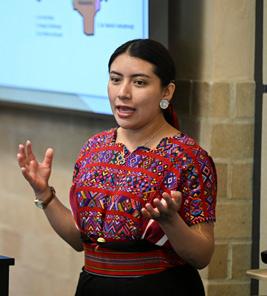
May 6, 2025
A Conversation with Juan Carlos de la Llera Martin Dignitaries from Pontificia Universidad Católica de Chile (PUC) joined Stanford faculty, alumni, and graduate students for a meet-and-greet at Bolívar House. De la Llera, PUC’s rector, holds a Ph.D. in Civic Engineering from UC Berkeley. He is a member of the National Academy of Engineering.

May 14-19, 2025
Mapping Absence: Global Explorations of Disappearance in Art, Law and Social Science

May 3, 2025
Evaluating the Impact of U.S. Sanctions on Cuba’s and Venezuela’s Economic and Political Crises
At this symposium, funded by the Tinker Fund and organized by Cuba Observatory Director Mikael Wolfe, alongside Tinker Visiting Professor Ernesto Domínguez López, a cadre of eight specialists discussed the multifaceted dimensions and effects of the economic sanctions imposed by the U.S. on Cuba and Venezuela. In attendance, both in person and online, were more than 20 students, faculty, and community members. Discussions showcased recent research and diverse views on the topic while demonstrating the profoundly detrimental effects of the sanctions on ordinary people in both countries, regardless of their purportedly targeted or formally comprehensive nature. This event exposed the core dynamics and implications of sanctions as a coercive tool in international relations. The organizers plan to collectively publish the presentations and discussions to expand the dialogue among other academics and non-academics.
This multi-day, interdisciplinary symposium offered on-campus and virtual presentations sponsored by the Tinker Fund through Stanford CLAS, with co-sponsorship from the Stanford Global Studies’ workshop “Law and Literature in the Global South,” the Division of Literatures, Cultures, and Languages, and the Departments of Anthropology and Art & Art History.
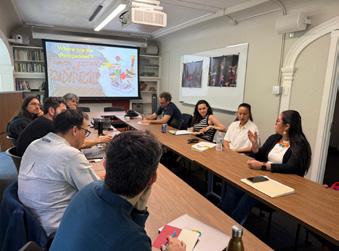
May 23, 2025
LASA Congress 2025 Reception with UT Austin
Stanford CLAS and UT Austin’s Teresa Lozano Long Institute of Latin American Studies (LLILAS) held a joint reception at the Mission Cultural Center for Latino Arts during the Latin American Studies Association (LASA) Congress 2025 in San Francisco. The event featured an academic poster exhibition by Tinker Field Research Grant recipients from both institutions, while allowing affiliated faculty and students to foster connections and potential collaborations in the field over appetizers, cocktails, and live Afro-Colombian music by the San Francisco-based band Neblinas del Pacífico.

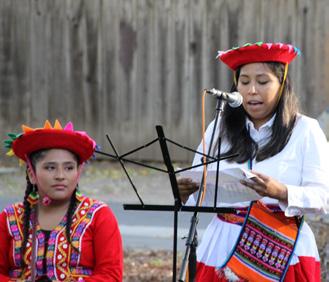
May 27, 2025 Quechua
Night 2025
During its annual celebration of Quechua culture and language, the Cafecito Quechua
Working Group organized an evening of Andean food, live music, dance, llamas, and Quechua language presentations with close to 100 guests from Stanford and the local Quechua language community.
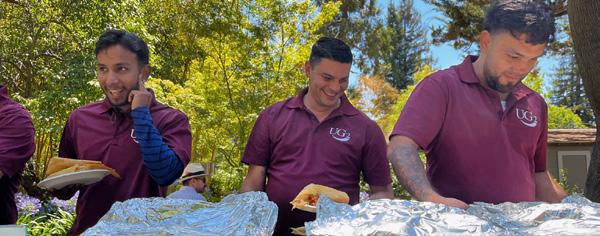
July 24, 2025
Tamaladay: A celebration of culture and service
In collaboration with the Office of Community Engagement, CLAS team members welcomed approximately 300 Stanford community members and served nearly 800 tamales from 10am to 3pm at the Bolívar House Gardens to create connection over a meal of authentic Mexican tamales and a variety of aguas frescas.
The chart to the left illustrates the primary disciplinary affiliations of the speakers of events held during the 2024-25 academic year.
7. Education 8. Environment 9. Government
The chart to the left illustrates the regions and communities discussed in events held during the 2024-25 academic year. 1. African and African American Studies 2. Anthropology
14. Philosophy 15. Photography
16. Political Economy
Art
Cultural Studies
Ecology
Economics
10. History
11. International Law
12. Literature
13. Music
17. Political Science
18. Social-Political Psychology
Argentina
Inca 10. Latin America 11. Latin American Diaspora, U.S.A.
12. Mesoamerica (Maya)
13. Mexico 14. Panama 15. Peru
Iberian Peninsula
16. Quechua 17. South America
18. United States/ Mexico Border
19. Uruguay 20. Venezuela
EVENT HIGHLIGHTS
CLAS CO-SPONSORED ACTIVITIES
Over the years, CLAS has co-sponsored conferences, performances, and events spearheaded by other departments and institutions both on and off campus. CLAS is pleased to provide financial and/or administrative support for a limited number of activities each year.
October 11, 2024
Labor and Liberation Across the Atlantic Symposium
This event was sponsored by Stanford Global Studies’ Oceanic Imaginaries, a multi-year initiative that adopts the world’s oceans as an analytical framework for advancing cross-regional, interdisciplinary research and activities addressing timely global topics.
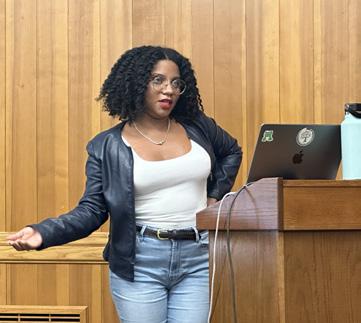
November 7, 2024
Covering Socialist Cuba: The Challenges and Rewards of Doing Alternative Journalism on a Country the US targets for Regime Change
The Cuba Observatory of Stanford’s Center for Latin American Studies hosted two prominent Havana-based journalists, Liz Oliva Fernandez and Ed Augustin, for a symposium discussing their award-winning work and experience covering Cuba in various media within and outside Cuba. The event provided alternative perspectives about a country and its revolution that have long been misunderstood and often maligned in U.S. mainstream media.
November 15, 2024
Commodity Markets in the History of Capitalism and Economic Growth
Co-sponsored by the King Center on Global Development and The Cuba Observatory, this symposium examined the role of commodity markets in advancing global economic systems, facilitating trade, and creating wealth. Presentations from guest scholars as well as discussions led by Stanford faculty, graduate workshops, and a keynote lecture explored how various commodity markets — such as cotton, sugar, coffee, and milk have shaped modern economic growth, highlighting both their benefits and drawbacks.
November 16, 2024, and March 8, 2025
Stanford Afro-Latin Jazz Ensemble Fall and Winter Concerts
The Department of Music’s Stanford Afro-Latin Jazz Ensemble, directed by Murray Low, presented its first performance of the academic year with music spanning the full breadth of Afro-Latin jazz — from its Afrofolkloric roots through Cuban son to classic and modern salsa and Brazilian music. The Winter Concert offered the Stanford community an exciting program featuring new Afro-Brazilian grooves, eighty-year-old danzón, classic salsa, samba, and modern instrumental mambo jazz.
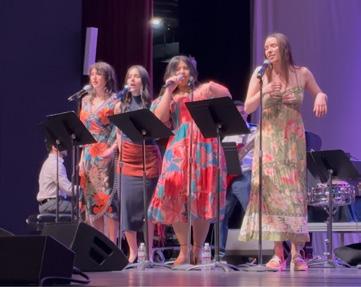
November 19, 2024
Itinerant Verses: Ali Lameda between North Korea and Venezuela
Drawing from a range of archival and literary sources, this lecture by historian Eilin Rafael Perez examined history at the scale of an individual, a state, and a human rights organization. It demonstrated how poetic practice as refracted through these scales complicates previous visions of a unified, Third World-led, anti-imperialist future, and how historicizing Lameda’s poetry reveals what human rights claims obscure. This event was part of Stanford Global Studies’ Oceanic Imaginaries, a multi-year initiative that adopts the world’s oceans as an analytical framework for advancing cross-regional, interdisciplinary research on timely global topics.
January 13, 2025
Biocentrism in the City? Recentering Knowledge When Nature Comes First
This talk by Dr. Javiera Barandiarán examined what biocentrism means to users of an urban park in Santiago, Chile, to advance theorizing on biocentrism–a philosophy or worldview in which nature comes first, alongside humans. Dr. Barandiarán is an associate professor of global studies at the UC Santa Barbara who explores the intersection of science, environment, and development in Latin America. This event was co-sponsored by the Global Studies’ Program in Science, Technology and Society.
January 28, 2025
Knowledge Capitalism, Hegemonic Transitions and Elections in Latin America
This hybrid meeting of the Latin American and Caribbean History Workshop, for Latin Americanist faculty and graduate students from both within and outside Stanford, featured a lecture by Tinker Visiting Professor Ernesto Domínguez López.
April 16, 2025
Governing the Terrain Called Beauty: LGBTQ Law in Cuba and the Queerness of Political Economies
This talk by Libby Adler (professor of Law and Women’s, Gender and Sexuality Studies, Northeastern University), co-sponsored by the Program in Feminist, Gender, and Sexuality Studies and Queer Student Resources Center, traced law and sexual identity in Cuba over the course of decades and explained how Cold War and post-Cold War political-economics shaped not only attitudes toward but also conceptions of sexual identity in Cuba.
April 30, 2025
An Introduction to Nahuatl Language and Culture
Eduardo de la Cruz Cruz, director of IDIEZ and associate instructor in the Department of World Languages and Cultures at the University of Utah, provided an interactive introductory lesson in Nahuatl language and culture to Stanford graduate and undergraduate students. This interactive class was co-sponsored by the DLCL.
May 1, 2025
The Digital Florentine Codex: A Resource Accessible to All
This presentation by Eduardo de la Cruz Cruz, director of the Institute for Teaching and Ethnological Research of Zacatecas (IDIEZ) and an associate instructor in the Department of World Languages and Cultures at the University of Utah, explored the perspectives and reflections of young Nahuas on the history of the conquest of Mexico, and the importance of having access to a resource like the Digital Florentine Codex. This event was co-sponsored by the Center for Comparative Studies in Race and Ethnicity and the Department of Comparative Literature.
May 1, 2025
Democracy on the Ground: Local Politics in Latin America’s Left Turn
Drawing on two years of fieldwork, author Gabriel Hetland compares attempts at participatory reform in cities governed by the Left and Right in Venezuela and Bolivia. Offering new perspectives on participation, populism, and Latin American politics, Hetland’s book challenges widespread ideas about the constraints on democracy. This book talk was co-sponsored by the Graduate School of Education.
May 15, 2025
An Enslaved Credit Market: Slavery, Contract Law, and Credit Circulation in 19th Century Rio de Janeiro
Professor Clemente Penna, from Universidade Federal de Santa Catarina in Brazil, presented his recently published work on the relationship between slavery and credit markets in early nineteenth-century Rio de Janeiro. Stanford Professor Zephyr Frank served as discussant, and Ph.D. candidate in History and Tinker Dissertation Completion Fellow Christian Robles-Baez moderated. This event was co-sponsored by the Department of History and the Stanford Humanities Center.

May 21, 2025
Indigenous Education, Racism, Territorial Autonomy and Forced Disappearances in Latin America: Learning from the Otros Sabers Perspective
The Council of Otros Saberes (Other Knowledges) shared findings from a set of research projects examining indigenous education, racism and territorial autonomy, and forms of violence, including forced disappearances in Latin America. This roundtable was co-sponsored by CDDRL and the King Center on Global Development.
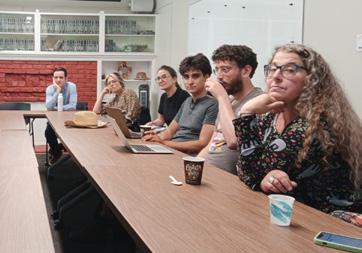
May 27, 2025
Poetry, Translation, and Publishing: A Multilingual Dialogue with Gustavo Guerrero and Whitney DeVos Co-sponsored by the Center for Poetics, this conversation brought forth rich insights into the mechanics of poetry from multiple perspectives, including the politics of the book and the potentialities of poetry across traditions and languages.
June 1, 2025
Música Cubana: Stanford AfroLatin Jazz Ensemble featuring Jesús Díaz
Guest artist Jesús Díaz, one of the most innovative musicians in the Afro-Latin genre, joined the Stanford Afro-Latin Jazz Ensemble for a special evening featuring his unique blend of modern Cuban music. Díaz is a worldclass percussionist, vocalist, and composer whose musical vision includes both traditional Afro-folkloric sensibilities as well as ultra-modern Cuban “timba” stylings.
PUBLIC ENGAGEMENT
CLAS is a U.S. Department of Education Title VI National Resource Center, receiving funding to further Latin American language and area studies at Stanford as well as in K-12 and community college education. Meaningful collaborations with other Stanford departments and institutions contributed greatly to the success of CLAS’s public engagement programming. We extend gratitude to our partners in this endeavor:
Stanford Global Studies (SGS) programs and centers; Stanford Graduate School of Education (GSE) Center to Support Excellence in Teaching (CSET) and Stanford World Language Project (SWLP); The Stanford Program on International and Cross-Cultural Education (SPICE, Freeman Spogli Institute for International Studies); Stanford University Libraries; Stanford Language Center; Lacuna Stories (Center for Spatial and Textual Analysis); Consortium of Latin American Studies Programs (CLASP); San José State University (SJSU) Department of World Languages and Literatures; University of California, Berkeley, Center for Latin American and Caribbean Studies; University of California, Davis, Hemispheric Institute on the Americas; University of California, Los Angeles, Latin American Institute; and University of Utah Center for Latin American Studies.
Educator Participation
K-12: 136
Community College: 140
University: 96
PROFESSIONAL DEVELOPMENT
The following professional development opportunities were offered throughout the 2024-25 academic year to educators from K-12 and higher education institutions.
Língua Portuguesa Professional Development Program
This program brings together service professionals in medicine, law, education, and other community-serving fields to study Portuguese language and culture with the goal of expanding the offering of Portuguese language courses in secondary and community college education and broadening the accessibility of professional services within Portuguese-speaking communities. The 2024-25 course was led by Valéria Caldas Vieira and included conversation practice sessions with Priscila Catalão.
October 2024-May 2025
Heritage Spanish Teachers Seminars
This academic-year professional development course is tailored to the pedagogical needs of the Heritage Spanish classroom in secondary education. The 2024-25 course featured scholars Jorge Ramón González-Ponciano, Ana Figueiredo, César Valenzuela, Rodrigo Reyes, and Adán Griego. The course was led by SWLP instructor leaders Antonio Tunzi and Michael Silva.
October 19, 2024; December 7, 2024; January 25, 2025; March 1, 2025; March 29, 2025

The 2026 Jhumki Basu Summer Institute on STEM Education will take place in the Galápagos.
Indigenous Languages of Latin America Fellowship and Symposium
CLAS and the Latin American Indigenous Studies Alliance (UC Berkeley, UCLA, and the University of Utah) launched a new fellowship program in 2024-25 for university-level instructors of Indigenous languages. This yearlong initiative supported a cohort of four fellows — Silvia Carrillo Godínez, Elodia Ramírez, Edber Dzidz Yam, and Angelina Trujillo working collaboratively on self-designed projects related to curriculum design, Indigenous pedagogies, and language research. The program began with a two-day intensive workshop at UC Berkeley and continued with monthly virtual meetings throughout the academic year, accompanied by pedagogy lead Adriana Roque Corona. Fellows explored Indigenous approaches to teaching and learning while developing curricular materials and instructional strategies for use in classrooms across the U.S. The fellowship culminated in a symposium at Stanford, which brought together educators of Indigenous languages from across the country to share their work, build community, and exchange ideas on teaching, revitalization, and institutional sustainability.
August 5-7, 2024; May 2-3, 2025
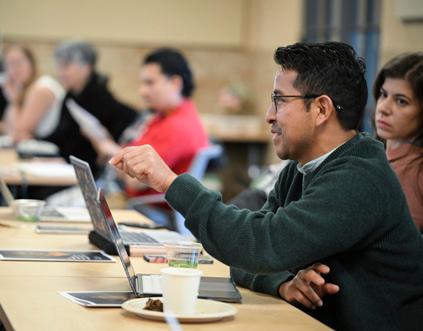
Pedagogy Fellow Edber Dzidz Yam contributes to a discussion at the May 2025 symposium.
Américas Book Award Author Workshops
CLAS co-sponsored the 2025 CLASP Américas Book Award, awarded to Libertad by Bessie Flores Zaldívar and Daughter of the Light-Footed People: The Story of Indigenous Marathon Champion Lorena Ramírez written by Belen Medina and illustrated by Natalia Rojas Castro. This year’s award activities included a webinar with Ari Tison, author of 2024 award winner Saints of the Household, as part of the 2025 Global Read Webinar Series. CLASP also hosted an author talk at the New Orleans Public Library and an educator workshop with Pedro Martín, author of 2024 award winner Mexikid.
September 24-25, 2024; March 25, 2025
Língua Portuguesa in Rio
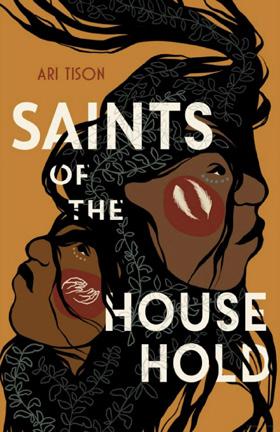
In its third year, Língua Portuguesa in Rio, an intensive Portuguese language program, took place in partnership with Caminhos Language Center in Rio de Janeiro, Brazil. Participants included service professionals in the fields of education, medicine, and law. The program followed a rigorous schedule to maximize participants’ language learning and cultural engagement, with morning language instruction and afternoon educational activities, including visits to an NGO in Favela Vidigal and to the urban Indigenous village Aldeia Maraká’nà. Additional educational enrichment included a talk by former CLAS Tinker Visiting Professor Aparecida Vilaça on the Wari’ of Rondônia, as well as a presentation by Liliane Santos and Maïra Gabriel Anhorn of the Redes da Maré team on the favelas of Rio de Janeiro.
July 13-19, 2025
Education Partnership for Internationalizing Curriculum (EPIC)
EPIC offers an annual series of outreach programs focused on strengthening the internationalization of curricula at community colleges and K-12 institutions. EPIC is a partnership between SGS area centers, CESTA, CSET, and SPICE. In 2024-25, EPIC welcomed 14 community college educators into the EPIC Faculty Fellowship Program and another six into the EPIC Leadership Program. EPIC offered four workshops, a symposium, and a one-day fair for community college students interested in global studies and/or global careers.
December 5, 2024; January 31, 2025; February 14, 2025; April 26, 2025; May 9, 2025; May 17, 2025
LIBRARY REPORT
The Stanford Libraries’ Latin American impact is visible across a broad spectrum of initiatives — from robust digital collections and in-person research support to curated displays of rare and distinctive materials.
A major database addition in the 2024-25 academic year was the Pragda Latin American Film Collection, now available through Stanford Libraries’ streaming digital platform. This curated selection features over 700 independent films ranging from short films (cortometrajes) to feature-length works (largometrajes) — that highlight diverse voices from Latin America and Spain.
As the embedded librarian for the LATINAM 397: Graduate Writing Seminar for Latin American Studies
M.A. research methods course, co-taught by the center’s director and associate director, Adán Griego continues to mentor students in navigating a rich trove of print and digital resources. He often echoes a key lesson from his own graduate studies: “La inexactitud en las citas es imperdonable” (“Inaccuracy in citations is unforgivable”), emphasizing the importance of rigorous citation practices.
In conjunction with the spring quarter symposium “Mapping Absence: Global Explorations of Disappearance in Art, Law, and Social Science,” Adán curated a special exhibition featuring 20 original items from Stanford Libraries’ Department of Special Collections. The exhibit included posters, limited-edition artists’ books, photographs, and ephemera, offering powerful visual narratives of absence and memory.
CLAS supports annual acquisition trips to major Latin American book fairs. This year, Adán attended FILUNI in Mexico City (hosted by the Universidad Nacional Autónoma de México), the Guadalajara International Book Fair, and the Buenos Aires Book Fair — each providing access to unique, hard-to-find publications with limited commercial distribution. He also participated in a Title VI intensive Portuguese language outreach program in Rio de Janeiro and coordinated a successful visit to Biblioteca Escritor Lima Barreto — a key literacy project by Redes de Maré in Nova Holanda’s favela community.
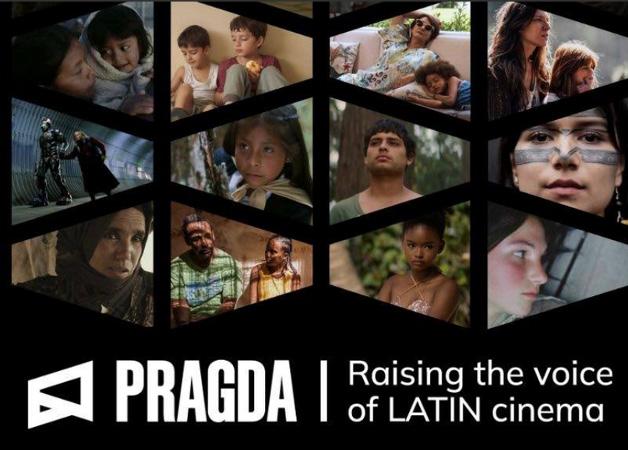
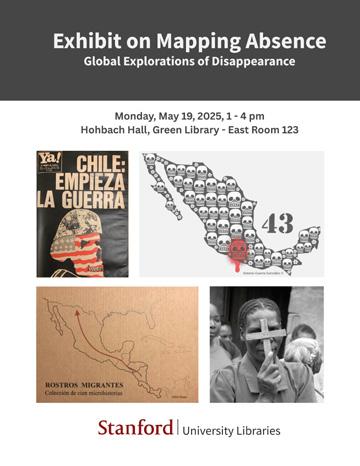
Announcement for the special library exhibition “Mapping Absence,” part of a hybrid interdisciplinary symposium.
Additionally, Adan’s co-authored chapter on the Spanish and Portuguese language publishing landscape for the open access Handbook for European Studies Librarians was selected by the American Library Association as one of the Best Historical Texts published in 2023-24.
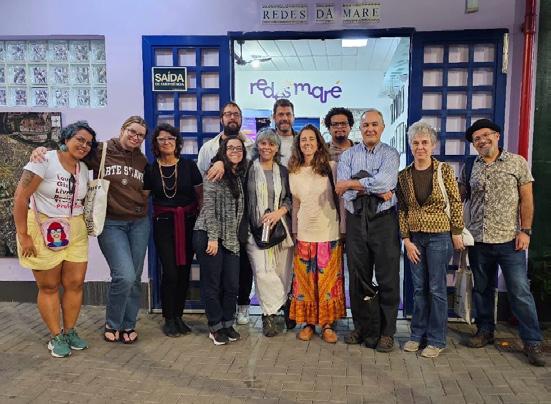
The Pragda Latin American Film Collection is raising the voice of Latin cinema. CLAS’s Adán Griego and Elizabeth Sáenz-Ackermann with participants of the Rio’s Lingua Portuguesa program and Redes de Maré team members.
ALUMNI UPDATES
Lola Amaya (M.A. ’24) successfully published her case study on President Nayib Bukele’s governance in El Salvador through Stanford’s Leadership Academy for Development. Supervised by Professor Francis Fukuyama and backed by firsthand fieldwork, her research breaks down Bukele’s controversial methods and their impact on democracy.
Alan Arroyo-Chávez (M.A. ’20) was promoted in March 2025 and is now the San Francisco Area Health Education Center (AHEC) Program Director in the San Francisco Community Clinic Consortium. Alan married Richard Reyes in July 2025 in Bogotá, Colombia.
Miguel Bacigalupe (M.A. ’11) graduated from Columbia Law School with honors in 2022. After graduation, he clerked for the Honorable Michael S. Nachmanoff of the U.S. District Court for the Eastern District of Virginia and has been working as an antitrust litigator at Freshfields US LLP in Washington D.C. Miguel is serving a oneyear term as a federal appellate clerk for the Honorable Julia S. Gibbons of the U.S. Court of Appeals for the Sixth Circuit.
Eda Benites (M.A. ’20) was promoted to Associate Director at MACLA (Movimiento de Arte y Cultura Latino Americana) this year.
Brian Bird (M.A. ’03) recently moved with his family to Austin, Texas, his wife’s hometown, to be closer to extended family.
Emilio Espinal (M.A. ’23) finished his second year as a client advocate at the San Diego County Public Defender office, Juvenile Division, and has started law school at California Western School of Law in San Diego.
Sean Gallagher (M.A. ’22) successfully completed his first year in Stanford Law School’s JD program.
Yangran Gao (M.A. ’22) is currently a second-year Ph.D. student at USC, focusing on the international political economy of East Asia and Latin America. Gao recently traveled to Mexico City and gave a talk on the comparison of the Chinese and Japanese auto sectors at Universidad Autónoma Metropolitana, Xochimilco,
and had the opportunity to discuss the market entry of Chinese electric vehicles into Mexico with scholars from UNAM and CIDE.
Darrow Hornik (M.A. ’23) is engaged with Evan Lewis. They met during the CLAS M.A. program orientation and moved to London for a year after graduating from CLAS before moving back to Palo Alto where Darrow has been working as an admission counselor for the Stanford Office of Undergraduate Admission. They are getting married in Wales in July 2026 and will be moving to Los Angeles, where Evan will start law school at UCLA
Karen Hoshino (M.A. ’24) just completed her M.A. in International Education Policy Analysis at the Stanford Graduate School of Education
Nathan Keegan (M.A. ’12) is happy to report a new position as the CTO of Booz Allen Hamilton Europe and is excited to connect with any CLAS folks interested in a tech career in Europe. He got married in 2024 and welcomed his son, Caetano, in June of the same year. He and his wife, Renata, are expecting a baby girl in October 2025.
Denis Minev (M.A. 1999) has recently been nominated as a special envoy to the private sector of the Amazon region for COP-30, the UN environmental conference which will take place in Belém in November 2025 and is looking forward to finding solutions that align conservation in the Amazon region with abundance and prosperity.
Alberto Mora (M.A. ’22) recently graduated from Harvard Graduate School of Education with a master’s degree focusing on education leadership, organizations, and entrepreneurship with a concentration in higher education and has now started a position as an academic advisor at Bunker Hill Community College.
Vijay M. Navarro (née Gallardo) (M.A. ’10) relocated to West Point, NY, to a teaching position as a professor in the Department of English and World Languages at the United States Military Academy. She is currently conducting linguistics research and writing her dissertation, which is
through the University of Miami’s Department of Modern Languages and Literatures. Recent publications include “Translanguaging in US K-12 science and engineering education: A review of the literature through the lens of equity” in the Journal of Research in Science Teaching.
Araceli Ortiz Steger (M.A. ’08) recently celebrated her first year as Head of People at GiveWell, a global health nonprofit dedicated to supporting highly cost-effective, evidence-based programs. She feels fortunate to be back in an organization making a global impact and recently enjoyed a cruise to Alaska with her husband, 3.5-year-old son, and parents to celebrate her 40th birthday.
Stefan Reiss (M.A. 1997) currently serves as the Director of Research Development at the University of Colorado Denver.
Hari Seshasayee (M.A. ’15) moved to Panama and partnered with a former foreign minister of Panama to found the Consilium Group, which advises companies and organizations on entering the Latin American market and Latin American banks and companies on expanding into the Asian market. Hari and his wife, Preeti, welcomed a newborn baby girl on January 12, 2025.
Luisa Farah Schwartzman (M.A. 2000) is currently a visiting scholar at Stanford’s Sociology Department. She plans to return to her position as an associate professor in the Sociology Department at the University of Toronto in the summer of 2026. Recent publications include “Racial Frontiers: Hemispheric Logics of Haitians’ Displacement and Asylum in the Americas” in Antipode.
Jessica Uno (M.A. ’12) is a child, adolescent, and adult outpatient psychiatrist, happy to be launching a new outpatient psychiatry program at Sutter East Bay Medical Group serving patients of all ages with mental health needs. She is really into gardening and recently celebrated her toddler’s second birthday.
TITLE
COMMENCEMENT 2025
CONGRATULATIONS TO THE CLASS OF 2025!
JUNE 15, 2025

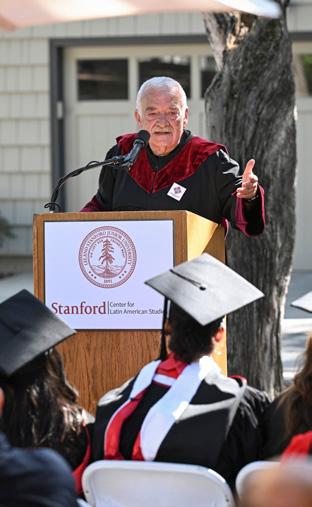
CLAS M.A. Students
Annís Joelle Barron
Que viva el bajo mundo: Dembow, Racialization, and Mueca in Capotillo, Santo Domingo
Faculty Advisor: Pedro Regalado
Fabián A. Carchi
Infrastructure Development in Latin America: The case of Mexican FIBRA-E Trusts (2016-2024)
Faculty Advisors: David Grusky, Alberto Díaz-Cayeros
Fabiola Astrid Cruz Li
Social Work in Toronto: Alternative and Critical Ways of Practicing Social Work with Latin American Migrants
Faculty Advisors: Zephyr Frank, Vivian Brates
Chenyu Deng
Unsettling/-ed Mother: Maternity and Nomadism in Mongolia by Julia Wong Kcomt
Faculty Advisors: Regina Pieck, Héctor Hoyos
Yuritzi Quintero Estrada
Sin Fronteras: Youth Engagement in Cultivating Sonoran Desert Foodways
Faculty Advisor: Rebecca Tarlau
Botao He
Racial Violence Beyond the Revolution: Chinese Migrants in the Making of the Mexican State
Faculty Advisor: Mikael Wolfe
Paola Parra
Bodies as Commodified Spaces in La invención de Morel
Faculty Advisors: José David Saldívar, Héctor Hoyos
Brandon Rubio
La herida abierta - Lucha Libre and Catharsis in the US-Mexico Borderlands
Faculty Advisors: Hans Ulrich Gumbrecht, Rose Salseda
Rebeca Sauly Santa Maria Granados
The Promises and Results of Populism: Tlaxcala’s Public Health Outcomes under Andrés Manuel López Obrador
Faculty Advisor: Alberto Díaz-Cayeros
Kallie L.V. White
Beyond Abolition: Continuities of AfroDescendant Surveillance and Subjugation in Rio de Janeiro’s Legal and Carceral Frameworks
Faculty Advisor: Zephyr Frank
Xinwen (Enru) Zhang
Immigrants Literature in Brazilian Mosaic: Relato de um certo Oriente and A chave de casa
Faculty Advisors: Zephyr Frank, Diana Klinger
Rachel Zila Hidalgo
Redefining Development from the Ground
Up: Social Impact Initiatives in São Paulo and Rio de Janeiro
Faculty Advisors: Javier Mejía, Mikael Wolfe
Left to Right: Héctor Hoyos, Yuritzi Estrada, Kallie White, Chenyu Deng, Annís Barron, Fabiola Cruz Li, Paola Parra, Rebeca Santa Maria Granados, Botao He, Enru Zhang, Brandon Rubio, Rachel Zila Hidalgo, Hans Ulrich Gumbrecht, Fabián A. Carchi, Rose Salseda.
Keynote address by Hans Ulrich Gumbrecht, Albert Guérard Professor of Literature, Emeritus.
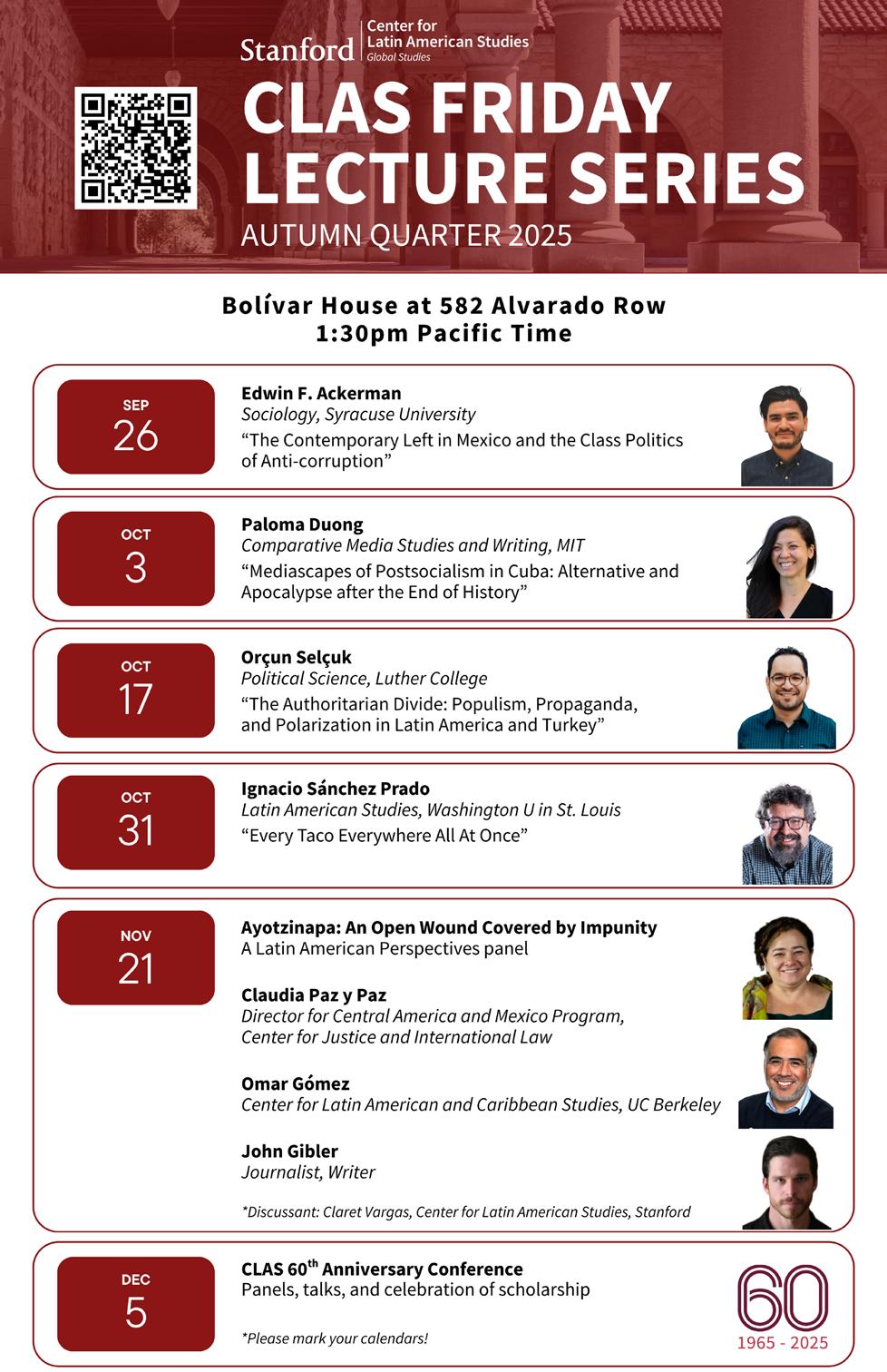
Connect with us
stanfordclas
StanfordCLAS
@StanfordCLAS youtube.com/@StanfordCLAS
latinamerica@stanford.edu
clas.stanford.edu
Stanford University 582 Alvarado Row Stanford, California 94305
